Competition Law Research Paper Topics

This page presents a comprehensive exploration of competition law research paper topics , designed to assist law students in their pursuit of academic excellence. As competition law continues to play a critical role in regulating market dynamics, students often face the challenge of choosing compelling research topics that reflect the evolving complexities of this field. Here, we highlight the diverse range of competition law research paper topics covered in this page, encompassing anti-competitive agreements, abuse of dominant market position, mergers and acquisitions, intellectual property issues, digital markets, international antitrust enforcement, consumer protection, public policy implications, and emerging issues in the digital era. Through this curated list of topics, students will gain insights into the multifaceted dimensions of competition law, fostering critical thinking and the ability to address real-world challenges in an ever-changing legal landscape. Whether investigating the intersection of competition law and technology or exploring the impact of global trade on market competition, this page aims to empower students with an array of research paper ideas to embark on their scholarly endeavors in competition law.

100 Competition Law Research Paper Topics
Competition law is a dynamic and multifaceted field that addresses various issues related to market competition, monopolies, consumer welfare, and economic efficiency. As law students delve into this intricate domain, they often encounter the challenge of selecting compelling research paper topics that reflect the evolving complexities of competition law. To aid students in their academic journey, we present a comprehensive list of competition law research paper topics, carefully curated and divided into ten categories, each offering unique insights into the realm of market regulation and antitrust enforcement.
Academic Writing, Editing, Proofreading, And Problem Solving Services
Get 10% off with 24start discount code.
Anti-competitive Agreements:
- The Role of Cartels in Market Manipulation: Case Studies and Impact on Consumers
- Horizontal vs. Vertical Agreements: Analyzing the Distinctions and Legal Implications
- Price Fixing and Collusion: Assessing the Challenges of Detecting and Prosecuting Anti-competitive Conduct
- Leniency Programs: Evaluating the Effectiveness in Combating Cartels and Encouraging Cooperation
- Trade Associations and Competition Law: Balancing Industry Cooperation and Compliance with Antitrust Regulations
- Technology Cartels and the Digital Age: Investigating Anti-competitive Practices in Tech Markets
- Intellectual Property and Competition: Antitrust Implications of Patent Pools and Cross-Licensing Agreements
- Compliance Mechanisms for Agreements: Promoting Ethical Business Practices and Preventing Collusion
- Bundling and Tying Arrangements: Analyzing the Impact on Market Entry and Consumer Choice
- Antitrust Enforcement in the Pharmaceutical Industry: Addressing Market Distortions and Access to Medicine.
Abuse of Dominant Market Position:
- Monopolization and Market Power: Analyzing the Criteria for Identifying Dominant Firms
- Predatory Pricing and Market Entry Barriers: Evaluating the Impact on Competitors and Consumers
- Exclusionary Practices by Tech Giants: The Intersection of Dominance and Digital Markets
- Leveraging Dominant Position to Enter Adjacent Markets: Examining the Antitrust Implications
- Essential Facilities Doctrine: Balancing Market Dominance and Access to Key Infrastructure
- Market Definition and Dominant Market Shares: Methodological Challenges in Identifying Dominant Firms
- Refusal to Deal and Essential Inputs: Assessing the Role of Dominant Entities in Supply Chains
- Intellectual Property and Dominant Firms: Exploring the Intersection of Competition Law and Patents
- Abusive Discrimination and Market Access: Analyzing the Legal Framework and Enforcement Challenges
- Monopoly Regulation in Developing Economies: Promoting Fair Competition and Economic Growth.
Mergers and Acquisitions:
- Merger Control Thresholds: The Balance between Market Concentration and Facilitating Business Transactions
- Failing Firm Defense: Evaluating the Criteria for Allowing Mergers in Distressed Companies
- Killer Acquisitions: Assessing the Impact of Acquiring Potential Competitors on Innovation
- Conglomerate Mergers and Market Power: The Challenges of Analyzing Diversified Entities
- Gun-Jumping and Pre-merger Coordination: The Role of Antitrust Agencies in Preventing Premature Actions
- Cross-Border Mergers: Analyzing the Challenges of Harmonizing Antitrust Enforcement in Global Transactions
- Market Definition in Merger Analysis: The Significance of Product and Geographic Market Definition
- Remedies in Merger Control: Evaluating the Effectiveness of Divestitures and Behavioral Conditions
- Merger Waves and Economic Cycles: Examining the Relationship between M&A Activities and Market Performance
- Merger Notification Procedures: Streamlining the Review Process and Ensuring Effective Decision-Making.
Intellectual Property and Competition Law:
- Standard-Essential Patents and FRAND Commitments: Balancing Innovation Incentives and Access to Essential Technologies
- Patent Thickets and Competition: Addressing Patent Pools and Overlapping Rights
- Intellectual Property Rights and Market Power: Antitrust Scrutiny of Dominant Firms with Strong IP Portfolios
- Technology Transfer Agreements and Antitrust Compliance: Evaluating Licensing Practices and Competition
- Trademarks and Market Distinctiveness: Analyzing the Antitrust Implications of Branding Strategies
- Copyright Licensing and Competition: The Interface between Copyright and Market Competition
- Big Data and Antitrust: The Impact of Data Dominance on Market Concentration and Consumer Choice
- Digital Rights Management and Competition Law: Striking a Balance between Copyright Protection and Market Access
- Antitrust Enforcement in the Digital Media Industry: Implications for Content Creators and Distribution Platforms
- Innovation and Market Dominance: The Interaction between Patent Protection and Competition Law.
Competition Law and Digital Markets:
- Big Tech and Platform Dominance: Investigating the Role of Technology Giants in Shaping Digital Markets
- Data Privacy and Antitrust: Analyzing the Relationship between Consumer Data and Market Power
- Online Platforms and Self-Preferencing: The Legal Boundaries of Fair Competition in E-Commerce
- Algorithmic Collusion: Detecting and Addressing Collusive Behavior in Automated Systems
- Digital Advertising and Competition: The Intersection of Targeted Ads and Market Concentration
- The Sharing Economy and Antitrust Regulation: The Challenges of Promoting Competition in Peer-to-Peer Platforms
- Internet Intermediaries and Market Fairness: Examining the Role of Online Intermediaries in Facilitating Market Access
- Digital Market Definition and Geographic Boundaries: The Challenges in Defining Online Markets
- Data Ownership and Market Power: The Antitrust Implications of Data Dominance in the Digital Era
- E-Commerce Platforms and Exclusionary Practices: Analyzing Anti-competitive Behavior in Online Markets.
International Antitrust Enforcement:
- Extraterritorial Application of Competition Law: The Legal Challenges and Global Cooperation Efforts
- Cross-Border Cartels: Investigating the Challenges of Multi-Jurisdictional Prosecution and Enforcement
- Regional Competition Agreements: Assessing the Role of Regional Bodies in Promoting Cross-Border Competition
- Merger Control in a Globalized Economy: Harmonization and Divergence of Merger Review Procedures
- Antitrust in the Digital Silk Road: The Impact of China’s Belt and Road Initiative on Global Markets
- International Trade and Market Access: Analyzing the Link between Antitrust and Trade Policies
- Antitrust and Developing Economies: Tailoring Enforcement to Local Contexts and Economic Development
- Antitrust Compliance in Cross-Border Mergers: Navigating the Legal Landscape of International Transactions
- Cross-Border Antitrust Investigations: Examining the Challenges of Collecting and Sharing Evidence
- Competition Advocacy in International Forums: Promoting Global Cooperation and Convergence.
Consumer Protection and Competition Law:
- Misleading Advertising and Consumer Deception: The Intersection of Consumer Rights and Market Competition
- Price Discrimination and Consumer Welfare: Analyzing the Impact on Vulnerable Populations
- Online Consumer Rights in Digital Markets: Ensuring Fair Practices and Redress Mechanisms
- Competition Law and Healthcare: Addressing Market Concentration and Access to Medicine
- Financial Services and Market Regulation: Consumer Protection in the Banking Sector
- Consumer Data and Privacy in the Digital Age: The Intersection of Consumer Protection and Data Dominance
- Unfair Competition Practices: Analyzing the Role of Unfair Competition in Restraining Market Access and Consumer Choice
- Product Safety and Market Competition: Balancing Innovation and Consumer Welfare
- Consumer Empowerment and Market Information: The Impact of Market Transparency on Consumer Decision-Making
- Competition Law Remedies for Consumer Harm: Evaluating the Effectiveness of Compensation Mechanisms.
Public Policy and Competition Law:
- Antitrust and Innovation: The Interplay between Market Competition and Technological Advancements
- Competition Policy and Economic Development: The Role of Antitrust in Fostering Economic Growth
- Political Influence and Market Concentration: Analyzing the Impact of Lobbying on Antitrust Regulation
- Market Regulation in Times of Crisis: Addressing Competition Challenges during Economic Downturns
- National Security and Competition Law: Balancing National Interests and Open Markets
- Market Power and Income Inequality: The Socioeconomic Implications of Market Concentration
- Technology Transfer and National Interest: Assessing the Role of Competition Law in Safeguarding Innovation
- Corporate Social Responsibility and Market Dominance: Examining Ethical Business Practices and Market Influence
- Environmental Sustainability and Competition Law: The Relationship between Competition and Green Business Practices
- Digital Sovereignty and Market Control: Navigating the Challenges of Global Technology Regulation.
Emerging Issues in the Digital Era:
- Artificial Intelligence and Antitrust: The Challenges of Addressing Algorithmic Collusion
- Blockchain Technology and Market Competition: The Potential of Decentralized Markets
- Data Monopolies and Market Distortion: Antitrust Implications in Data-Driven Economies
- Internet of Things and Market Dominance: The Intersection of Connected Devices and Competition Law
- Virtual Markets and Market Power: Analyzing the Antitrust Impact of Virtual Goods and Services
- Privacy Regulation and Competition Law: The Balancing Act between Data Protection and Market Competition
- Digital Disinformation and Competition Law: Addressing Misinformation and Consumer Manipulation
- Competition Law Enforcement in the Gig Economy: The Challenges of Regulating Flexible Work Arrangements
- Smart Cities and Antitrust: The Impact of Technological Urbanization on Market Concentration
- Cybersecurity and Market Competition: The Role of Antitrust in Protecting Against Cyber Threats.
Case Studies in Competition Law:
- Microsoft Antitrust Case: Analyzing the Legacy of the U.S. v. Microsoft Corp. Case
- Google Antitrust Cases: Assessing the EU’s Multiple Investigations into Google’s Market Dominance
- Apple vs. Epic Games: The Antitrust Battle over App Store Policies and Market Access
- Qualcomm vs. FTC: The Antitrust Litigation over Qualcomm’s Licensing Practices
- Intel Antitrust Case: Examining the European Commission’s Decision on Intel’s Market Dominance
- Amazon and Antitrust: Investigating Amazon’s Role as a Dominant E-Commerce Platform
- Facebook and Market Dominance: The Antitrust Scrutiny of Social Media Platforms
- Standard Oil and the Origins of Antitrust: A Historical Perspective on Competition Regulation
- Uber and Antitrust: Addressing the Competition Challenges in the Ride-Hailing Industry
- Visa and Mastercard Antitrust Cases: Analyzing the Legal Battle over Credit Card Network Fees.
In conclusion, this comprehensive list of competition law research paper topics offers a diverse and extensive range of areas for exploration in the dynamic field of antitrust regulation and market competition. From examining the implications of anti-competitive agreements to navigating the challenges of regulating digital markets, students will find ample opportunities to delve into complex legal issues and contribute to the ongoing evolution of competition law. By exploring these thought-provoking topics, students can enhance their critical thinking skills, develop a deeper understanding of legal complexities, and contribute to the advancement of competition law jurisprudence. This carefully curated collection aims to empower law students in their academic pursuits and inspire them to undertake impactful research in the realm of competition law.
Competition Law: Exploring the Range of Research Paper Topics
Competition law, also known as antitrust law in some jurisdictions, is a crucial area of legal study that aims to promote fair competition and prevent anti-competitive practices in the marketplace. It plays a vital role in maintaining a level playing field for businesses, safeguarding consumer interests, and fostering economic efficiency. As students of law venture into the realm of competition law, they are presented with a vast and ever-evolving landscape of legal issues to explore and analyze. This section delves into the multifaceted world of competition law research paper topics, highlighting key areas of interest and offering valuable insights to inspire law students in their academic pursuits.
The Evolution of Competition Law
To begin our exploration, it is essential to understand the historical development of competition law. Students can investigate the origins of antitrust regulation, examining landmark cases and legislative milestones that have shaped the field over time. They can explore how competition law has evolved to adapt to new economic challenges and technological advancements, such as the impact of globalization and the digital era on market competition.
Theoretical Perspectives in Competition Law
Competition law draws upon various economic theories to justify its existence and guide its application. Students can delve into different theoretical perspectives, such as the Chicago School of thought, the Harvard School, and the Post-Chicago School, and critically analyze their implications for antitrust policy and enforcement. This area of research allows students to explore the tensions between economic efficiency and consumer welfare, as well as the role of competition authorities in balancing competing objectives.
Comparative Analysis of Competition Laws
Conducting a comparative study of competition laws across different jurisdictions provides an enriching research opportunity. Students can compare and contrast the legal frameworks, enforcement approaches, and policy objectives of various countries, shedding light on the diversity of approaches to competition regulation and identifying potential areas of harmonization or cooperation in the global context.
Market Definition and Dominance Assessment
Defining relevant markets and assessing market dominance are critical steps in competition law analysis. Research papers in this area can explore the methodologies used by competition authorities to define markets, measure market power, and identify dominant firms. Students can examine the challenges of market definition in emerging sectors, such as digital markets and technology-driven industries.
Anti-competitive Agreements
The prohibition of anti-competitive agreements lies at the core of competition law. Students can investigate the different types of agreements, such as cartels, price-fixing arrangements, and bid-rigging, and explore the legal and economic consequences of such collusive practices. Research papers may delve into leniency programs, the role of whistleblowers, and the use of technology in detecting and prosecuting anti-competitive agreements.
Abuse of Dominant Market Position
Analyzing cases of market dominance and abuse is an area of significant interest in competition law research. Students can examine the factors that contribute to market power, such as barriers to entry, network effects, and economies of scale, and explore how dominant firms may engage in exclusionary conduct to maintain or strengthen their position in the market. This research can include the examination of cases involving monopolization, predatory pricing, and refusal to deal.
Merger Control and Consolidation
Mergers and acquisitions have the potential to impact market competition significantly. Research papers in this area can focus on the effectiveness of merger control regulations in preventing anti-competitive consolidation, the role of economic analysis in merger reviews, and the challenges of regulating cross-border mergers. Students can explore the factors considered by competition authorities when evaluating the competitive effects of mergers and the design of remedies to address potential anti-competitive concerns.
Competition Law Enforcement in the Digital Age
As the world becomes increasingly digitalized, competition law faces new challenges in addressing the unique issues arising in the digital marketplace. Students can investigate the role of competition law in regulating online platforms, data-driven markets, and the use of algorithms. They may examine the complexities of applying traditional competition principles to the digital economy and consider the role of big data, artificial intelligence, and machine learning in competition enforcement.
Sector-Specific Competition Law
Competition law is often tailored to address specific industries or sectors. Students can explore sector-specific competition regulations, such as competition law in the healthcare industry, telecommunications, financial services, or energy markets. This research allows for an in-depth examination of the particular challenges and policy objectives that arise in different sectors and how competition law can be adapted to address sector-specific issues.
Competition Policy and Public Interest Considerations
Competition law enforcement is not only about promoting efficiency and consumer welfare but also involves considerations of public interest and broader societal objectives. Students can delve into the interface between competition law and public policy, examining cases where competition enforcement has been influenced by non-economic concerns, such as environmental protection, access to essential services, or cultural preservation.
The realm of competition law research offers a vast landscape of compelling topics that reflect the intricacies of market regulation, antitrust enforcement, and consumer protection. As law students engage in exploring these research paper topics, they embark on a journey to understand the complexities and significance of competition law in shaping the competitive dynamics of modern economies. Through their scholarly pursuits, students not only contribute to the academic discourse but also play a crucial role in advancing the field of competition law and its impact on society and economic welfare.
How to Choose Competition Law Research Paper Topics
Selecting a research paper topic is a crucial step in the academic journey of law students. The field of competition law offers a diverse range of fascinating and relevant issues for exploration, making the process of choosing the right research topic both exciting and challenging. This section provides valuable insights and practical tips to help students navigate the process of selecting compelling and well-defined competition law research paper topics that align with their interests, expertise, and academic goals.
- Identify Your Area of Interest : Begin by identifying your area of interest within the broad scope of competition law. Are you intrigued by antitrust enforcement in the digital economy, mergers and acquisitions, or the economic implications of market dominance? By narrowing down your interests, you can focus on specific topics that resonate with your passion for the subject.
- Conduct Preliminary Research : Before finalizing your research topic, conduct preliminary research to familiarize yourself with recent developments and emerging trends in competition law. Stay updated with landmark cases, policy changes, and academic publications in the field. This background research will help you identify gaps in the existing literature and potential areas for further exploration.
- Define Your Research Objectives : Clearly define your research objectives and the specific questions you aim to answer in your paper. Are you seeking to analyze the effectiveness of certain competition law regulations, explore the impact of market consolidation, or evaluate the role of competition enforcement in specific industries? Having well-defined research objectives will guide your selection of a focused and relevant topic.
- Analyze the Legal Framework : Competition law operates within a legal framework that varies across jurisdictions. If you are interested in conducting a comparative analysis, choose a topic that allows for a meaningful comparison of competition laws in different countries. Understanding the legal context is essential for framing your research question and methodology.
- Consider Practical Implications : Assess the practical implications of your chosen research topic. How does your research contribute to the ongoing discourse on competition law? Is there potential for your findings to inform competition policy or impact the enforcement practices of competition authorities? Topics with practical significance can add value to your research and demonstrate its relevance in the real world.
- Consult with Faculty and Peers : Engage in discussions with your faculty members and peers to seek their input and feedback on potential research topics. Collaborating with others can provide new perspectives, help refine your ideas, and ensure that your research aligns with academic standards and expectations.
- Access to Data and Resources : Consider the availability of data and resources relevant to your research topic. Access to comprehensive data and credible sources can significantly enhance the quality and depth of your research. Ensure that you have access to the necessary legal texts, court decisions, economic data, and academic literature to support your analysis.
- Timeliness and Relevance : Choose a research topic that is timely and relevant to the current state of competition law. Topics that address emerging issues, recent court decisions, or changes in regulatory approaches can attract greater interest from readers and contribute to ongoing debates in the field.
- Originality and Contribution : Strive for originality in your research topic and aim to make a unique contribution to the field of competition law. Avoid topics that have been extensively covered or lack novelty. Consider how your research can fill gaps in existing literature or offer fresh perspectives on well-known issues.
- Stay Open to Exploration : Finally, remain open to exploring new ideas and adjusting your research focus as you delve deeper into the literature. As you progress in your research journey, new insights may lead you to refine your research question or explore related areas that enrich your paper.
Selecting the right competition law research paper topic is a critical step in producing a compelling and impactful academic work. By identifying your interests, conducting thorough research, defining your objectives, and considering practical implications, you can narrow down your choices and choose a topic that aligns with your academic goals and contributes meaningfully to the field of competition law. Remember to seek guidance from faculty and peers, access credible resources, and stay open to exploration as you embark on your research journey.
How to Write a Competition Law Research Paper
Writing a competition law research paper requires a systematic approach that combines legal analysis, economic insights, and critical thinking. As law students delve into the complexities of competition law, they must effectively communicate their findings and arguments in a well-structured and coherent manner. This section provides valuable guidance on how to write a compelling competition law research paper, from planning and conducting research to structuring the paper and presenting the analysis effectively.
- Define Your Research Question : At the outset, clearly define your research question or thesis statement. Your research question should be specific, focused, and aligned with the objectives of your study. It serves as the guiding compass throughout the writing process and ensures that your paper remains cohesive and on track.
- Conduct Thorough Research : Competition law research papers require a comprehensive examination of legal texts, court decisions, academic literature, and economic data. Conduct thorough research using authoritative sources to gather relevant information, legal precedents, and empirical evidence to support your arguments.
- Create an Outline : Before diving into writing, create a detailed outline that outlines the structure of your paper. An outline helps organize your thoughts, provides a logical flow to your arguments, and ensures that you cover all essential aspects of your research.
- Introduction : The introduction should provide context for your research topic, present the research question, and outline the scope and objectives of your paper. Engage your readers with a compelling opening and highlight the significance of your research in the context of competition law.
- Literature Review : Conduct a thorough literature review to situate your research within the existing body of scholarship on competition law. Identify key theories, legal principles, and economic concepts that inform your research and highlight any gaps in the literature that your paper aims to address.
- Legal Analysis : Present a detailed legal analysis of the relevant competition law principles, statutes, and court decisions that are central to your research question. Analyze how these legal frameworks apply to the specific issues or cases you are examining. Use clear and precise legal language while supporting your analysis with authoritative sources.
- Economic Analysis : If your research involves economic aspects, provide an economic analysis that complements your legal analysis. Integrate economic concepts, such as market power, consumer welfare, and efficiency, into your arguments. Use empirical data, economic models, and economic theory to support your findings.
- Case Studies : Consider incorporating case studies or real-world examples to illustrate your arguments and demonstrate how competition law principles are applied in practice. Case studies provide valuable insights and strengthen the practical relevance of your research.
- Antitrust Policy Implications : Discuss the policy implications of your research findings. Consider how your analysis informs antitrust policy, enforcement practices, and potential legislative reforms. Offer practical recommendations for policymakers and competition authorities based on your research.
- Conclusion : In the conclusion, restate your research question and summarize the main findings of your paper. Emphasize the significance of your research and its contribution to the field of competition law. Discuss any limitations of your study and propose areas for further research.
- Citations and References : Ensure that you use proper citations and references throughout your paper to acknowledge the sources of your information and ideas. Follow the appropriate citation style, such as APA, MLA, or Chicago, as required by your academic institution.
- Review and Revise : Writing a competition law research paper is an iterative process. After completing the first draft, review your paper for clarity, coherence, and consistency. Revise your arguments, strengthen your analysis, and ensure that your paper adheres to academic standards.
- Seek Feedback : Seek feedback from professors, mentors, or peers to get valuable insights and suggestions for improvement. Feedback from others can help refine your arguments, clarify your writing, and enhance the overall quality of your research paper.
Writing a competition law research paper requires a rigorous approach that integrates legal analysis, economic insights, and scholarly research. By defining a clear research question, conducting thorough research, and structuring your paper effectively, you can craft a compelling and impactful research paper that contributes to the vibrant field of competition law. Through careful writing and presentation of your analysis, you can convey your expertise, critical thinking, and understanding of complex legal issues to your readers.
iResearchNet’s Custom Research Paper Writing Services
At iResearchNet, we understand the challenges that law students face when tasked with writing a competition law research paper. The field of competition law is dynamic and complex, requiring a deep understanding of legal principles, economic theories, and real-world applications. We recognize the importance of producing high-quality research papers that not only meet academic standards but also contribute to the advancement of competition law knowledge. To support students in their academic journey, we offer custom competition law research paper writing services that cater to their unique needs and requirements.
- Expert Degree-Holding Writers : At iResearchNet, we pride ourselves on having a team of expert writers who possess advanced degrees in law and related fields. Our writers are well-versed in competition law and have a keen understanding of legal principles and economic concepts. With their expertise, they can deliver comprehensive and well-researched papers that meet the highest academic standards.
- Custom Written Works : We believe in providing personalized solutions to our clients. Each competition law research paper is custom written based on the specific requirements and instructions provided by the student. Our writers conduct thorough research, analyze legal and economic aspects, and craft original papers that address the unique research questions and objectives of each client.
- In-Depth Research : Competition law research papers require in-depth research and analysis. Our writers have access to extensive academic databases, legal texts, court decisions, and economic data, enabling them to gather credible and relevant information for each paper. We ensure that our research papers are comprehensive, well-supported, and up-to-date.
- Custom Formatting : Academic formatting is a crucial aspect of research papers. Our writers are proficient in various citation styles, including APA, MLA, Chicago/Turabian, and Harvard. They meticulously adhere to the specified formatting guidelines, ensuring that each paper is presented professionally and in accordance with the academic requirements.
- Top Quality : At iResearchNet, we prioritize quality above all else. Our dedicated quality assurance team reviews each research paper to ensure accuracy, coherence, and adherence to the client’s instructions. We aim to deliver research papers that demonstrate thorough analysis, critical thinking, and a deep understanding of competition law.
- Customized Solutions : We understand that each competition law research paper is unique, requiring individualized attention and focus. Our writers work closely with clients to understand their research objectives, preferences, and specific areas of interest. This collaborative approach allows us to deliver customized solutions that align with each student’s academic goals.
- Flexible Pricing : We offer competitive and transparent pricing for our custom competition law research paper writing services. Our pricing model is designed to accommodate students with varying budget constraints. We believe in providing value for money by offering high-quality research papers at affordable rates.
- Short Deadlines : We recognize that students often face tight deadlines when completing their research papers. At iResearchNet, we are equipped to handle urgent orders with short deadlines, delivering high-quality papers within as little as three hours. Our fast turnaround ensures that students can meet their submission deadlines without compromising on quality.
- Timely Delivery : We understand the importance of timely delivery for students. Our team is committed to delivering completed research papers within the agreed-upon deadlines. We value punctuality and ensure that clients receive their papers promptly, allowing them ample time for review and revision if needed.
- 24/7 Support : Our customer support team is available 24/7 to assist clients with any queries, concerns, or requests. Whether you need to track your order, communicate with your assigned writer, or seek updates on your paper’s progress, our support team is always ready to provide prompt assistance.
- Absolute Privacy : At iResearchNet, we prioritize the privacy and confidentiality of our clients. All personal information and communication are kept strictly confidential, and we do not disclose any client details to third parties. We use secure encryption technology to safeguard client data and ensure a safe and secure environment for transactions.
- Easy Order Tracking : Our user-friendly platform allows clients to easily track the progress of their orders. You can stay informed about the status of your research paper, communicate with your writer, and access completed drafts conveniently through our website.
- Money Back Guarantee : We are confident in the quality of our services, and we offer a money-back guarantee to ensure client satisfaction. If a client is not satisfied with the delivered research paper or if it does not meet the specified requirements, we provide a refund as per our money-back policy.
At iResearchNet, we are dedicated to supporting law students in their academic pursuits by offering custom competition law research paper writing services that cater to their unique needs. Our team of expert writers, commitment to quality, and personalized approach ensure that each research paper is crafted to the highest academic standards and contributes to the advancement of competition law knowledge. With our reliable and efficient services, students can confidently embark on their competition law journey, knowing that they have a trusted partner in iResearchNet.
Unleash the Potential of Your Research with iResearchNet
Are you a law student looking to excel in the field of competition law research? Do you find yourself grappling with complex legal principles and economic concepts while writing your competition law research paper? Look no further! iResearchNet is here to empower your academic journey and unleash the full potential of your competition law research.
Unleash the potential of your competition law research with iResearchNet’s custom research paper writing services. Our expert guidance, personalized approach, and commitment to quality empower you to excel in your academic pursuits. Let us be your trusted partner in navigating the complexities of competition law and crafting research papers that leave a lasting impact. Take the next step in your competition law journey with iResearchNet, and watch your academic achievements soar to new heights. Get started today and experience the difference!
ORDER HIGH QUALITY CUSTOM PAPER

Articles on Competition law
Displaying 1 - 20 of 56 articles.

Politics with Michelle Grattan: Andrew Leigh on competition - economic and political
Michelle Grattan , University of Canberra

Why are Apple, Amazon, Google and Meta facing antitrust lawsuits and huge fines? And will it protect consumers?
Zena Assaad , Australian National University

Scrutiny of OpenAI and Microsoft relationship could affect how AI industry grows and innovates
Matthew Olczak , Aston University ; Jon Guest , Aston University , and Karishma Patel , Aston University

Canada’s competition laws just changed: Here’s what you need to know
Jennifer Quaid , L’Université d’Ottawa/University of Ottawa

US regulator is suing Amazon – here’s what this could mean for your online shopping
Renaud Foucart , Lancaster University

Despite legal costs awarded to Rogers-Shaw , the competition commissioner’s challenge to the telecom merger was not a waste of taxpayer money

Increasing monopoly power poses a threat to Canada’s post-pandemic economic recovery
Garros Gong , University of Waterloo

Debate: The end of the internal-combustion car: why competition is vital to bringing about cleaner transport
Anna Souakri , ESCP Business School and Jean-Marc Daniel , ESCP Business School

Why post-Brexit Britain is still open for business – despite what Microsoft says
Tolu Olarewaju , Keele University

Rogers-Shaw case unexpectedly rewrote merger law, but there’s still time to change that

JetBlue merger with Spirit not cleared for takeoff – why Justice Department is suing to scupper deal
Joe Mazur , Purdue University

Why the South African state should not subsidise minibus taxi owners
Andrew Kerr , University of Cape Town

Provincial competition law needed to address the power of gig work platforms
Vasiliki Bednar , McMaster University and Robin Shaban , Carleton University

Allan Fels: As ACCC chair, Gina Cass-Gottlieb will put the public interest first, despite years of fighting for business
Allan Fels , The University of Melbourne

Google loses appeal against €2.4 billion fine: tech giants might now have to re-think their entire business models

Why Facebook antitrust case relies so heavily on Mark Zuckerberg’s emails
Rebecca Haw Allensworth , Vanderbilt University

Vital Signs. Google shouldn’t subsidise journalism, but the government could
Richard Holden , UNSW Sydney

How Nigeria’s new competition law will benefit the economy - and what to watch for
Oluchukwu Precious Obioma , University of Nigeria

Car wars: how Nokia could find itself at centre of EU investigation over technology patents
Enrico Bonadio , City, University of London and Luke McDonagh , City, University of London

The fightback against Facebook is getting stronger
Leighton Andrews , Cardiff University
Related Topics
- Competition
- competition commission
- Effects test
- Harper Review
- South Africa
Top contributors
Professor, Melbourne Law School, The University of Melbourne
Professor, Monash University
Competition Lawyer; Senior Fellow, The University of Melbourne
Associate Professor & Vice-Dean Research, Civil Law Section, Faculty of Law, L’Université d’Ottawa/University of Ottawa
Professor of Economics and Lead Researcher, Centre for Competition, Regulation and Economic Development, UJ, University of Johannesburg
Senior Lecturer in Economics, Lancaster University Management School, Lancaster University
Professor of Economics, Director of the Australian Institute for Business and Economics, The University of Queensland
Professor of Law, Discipline of Law, Justice and Society, University of South Australia
Associate Professor, Melbourne Law School, The University of Melbourne
Professor in Transport and Logistics Network Modelling, University of Sydney
Professorial Fellow, The University of Melbourne
Professor of Health Economics, University of Technology Sydney
Professor of Politics, University of Warwick
Vice Chancellor's Fellow at Victoria University and Adjunct Professor of Economics, Victoria University
Senior Lecturer in the School of Education, Deakin University
- X (Twitter)
- Unfollow topic Follow topic

Research Handbook on Methods and Models of Competition Law
- Contributors
- Acknowledgements
- Table of cases
- Table of legislation
- Chapter 1: Competition law in flux: established and emerging approaches to methodology
- Chapter 2: The ambit of competition law: comments on its goals
- Chapter 3: The cost of progress: hurdles facing antitrusts economic advance
- Chapter 4: The relevance of economics in US, EU and Australian competition law
- Chapter 5: The use of economics in competition law enforcement in mainland China and Hong Kong
- Chapter 6: Cartel prohibition and the search for deterrent penalties: the United States, the European Union, Australia and China compared
- Chapter 7: Algorithm-driven collusive conduct
- Chapter 8: Vertical agreements under EU competition law: proposals for pushing Article 101 analysis, and the modernization process, to a logical conclusion
- Chapter 9: Unilateral conduct analysis: focus on harm in multiple guises
- Chapter 10: Mergers
- Chapter 11: Competition law in Japan, Malaysia and the Philippines: an overview
- Chapter 12: Building an efficient system of protection of competition in Serbia on its path to the EU
- Chapter 13: Merger review updates in Latin America
- Chapter 14: The interface between intellectual property rights and competition law: implications for public health in sub-Saharan Africa
- Chapter 15: Pay for delay in perspective: the impact of adversarial and inquisitorial legalism on pharmaceutical antitrust enforcement
- Chapter 16: The Australian approach to third party infrastructure access under Part IIIA of the Competition and Consumer Act 2010
- Chapter 17: The EU method of antitrust enforcement
- Chapter 18: Cartel enforcement: critical reflections from the South African experience
- Chapter 19: Procedure and substance in Chinas merger control regime
- Chapter 20: An effective way to keep power in an institutional cage: legislation and regulation of administrative monopoly
- Chapter 21: Competition advocacy: a broader perspective
- Chapter 22: Export cartels in times of populist protectionism: challenges and options for young and small competition agencies
- Chapter 23: Complementarities and tensions between competition and trade law and policy
- Competition and Antitrust Law
- Research Methods in Law

- [66.249.64.20|185.148.24.167]
- 185.148.24.167
Character limit 500 /500
Current Issues in Competition Law: Practice and Perspectives
- UWA Law School
- Multi-Discipline
Research output : Book/Report › Edited book/Anthology
Fingerprint
- Practice Social Sciences 100%
- Competition Social Sciences 100%
- Trade Practices Social Sciences 33%
- Occupations Social Sciences 33%
- Subject Social Sciences 33%
- Academy Social Sciences 33%
- Relevance Social Sciences 16%
- Monopolies Social Sciences 16%
Research output
- 1 Edited book/Anthology
Research output per year
Current Issues in Competition Law: Context and Interpretation
- Competition 100%
- Trade Practices 25%
- Occupations 25%
- Subject 25%
- Academy 25%
T1 - Current Issues in Competition Law: Practice and Perspectives
A2 - Gvozdenovic, Michael
A2 - Puttick, Stephen
N2 - Over the past 30 years, the Australian statutory regime regulating competition and restrictive trade practices has been the subject of much significant reform. The evolution has been driven by the legislative, executive, and judicial branches of government. In this respect, debates – some familiar, others more novel – continue. These debates are occurring in the profession, the academy, and even in the media and the broader community. After all, the harms which Australian competition law seeks to prevent, and redress, have significant, direct impacts across society, from sophisticated multinationals to the everyday consumer. Meanwhile, the regulator in Australia, the Australian Competition and Consumer Commission, is notoriously active in promoting and enforcing (including testing the limits of) the prohibitions on restrictive trade practices.Part IV of the statutory regime regulates inter alia cartel conduct, anti-competitive contracts and collusive conduct, misuse of market power, and mergers. This volume comprises essays that examine many of the key questions and debates in respect of each of the prohibitions. The focus is on the Australian statutory topography and the collection is avowedly concerned with debates and issues of contemporary importance. The chapters traverse a range of topics of significance today, and which are likely to continue to be of special relevance into the future. It includes perspectives from the judiciary, the regulator, the practising profession, and the academy, including a foreword by the Honourable Justice Nye Perram.This volume, along with the companion volume, is essential reading for those called upon to determine competition matters, lawyers practising in competition and commercial law, and those teaching and researching the subject.
AB - Over the past 30 years, the Australian statutory regime regulating competition and restrictive trade practices has been the subject of much significant reform. The evolution has been driven by the legislative, executive, and judicial branches of government. In this respect, debates – some familiar, others more novel – continue. These debates are occurring in the profession, the academy, and even in the media and the broader community. After all, the harms which Australian competition law seeks to prevent, and redress, have significant, direct impacts across society, from sophisticated multinationals to the everyday consumer. Meanwhile, the regulator in Australia, the Australian Competition and Consumer Commission, is notoriously active in promoting and enforcing (including testing the limits of) the prohibitions on restrictive trade practices.Part IV of the statutory regime regulates inter alia cartel conduct, anti-competitive contracts and collusive conduct, misuse of market power, and mergers. This volume comprises essays that examine many of the key questions and debates in respect of each of the prohibitions. The focus is on the Australian statutory topography and the collection is avowedly concerned with debates and issues of contemporary importance. The chapters traverse a range of topics of significance today, and which are likely to continue to be of special relevance into the future. It includes perspectives from the judiciary, the regulator, the practising profession, and the academy, including a foreword by the Honourable Justice Nye Perram.This volume, along with the companion volume, is essential reading for those called upon to determine competition matters, lawyers practising in competition and commercial law, and those teaching and researching the subject.
M3 - Edited book/Anthology
SN - 9781760023133
BT - Current Issues in Competition Law: Practice and Perspectives
PB - The Federation Press

International & Comparative Competition Law Research: Web Resources
- Getting Started
- Web Resources
There are numerous free websites that can assist in researching the areas of international and comparative antitrust. Listed at right and below are sites with links to national competition authorities, blogs, news developments, and other materials of interest.
Competition & Consumer Protection Authorities Worldwide
The U.S. Department of Justice Antitrust Division offers an alphabetized list of links to antitrust authorities worldwide. The Federal Trade Commission offers a similar link .
European Union Competition Cases
Information on EU competition cases, including case databases and archives, is available through the EU Commission's website on competition policy . Pull-down menus for the antitrust, cartels, mergers, state aid, and liberalisation tabs all contain separate links to cases. The European Court of Justice's CURIA database also allows for searching limited to competition cases.
Note that the Law Library has a print subscription to the Common Market Law Reports (CMLR), which provides weekly coverage of EU case law . The CMLR also includes the monthly CMLR Antitrust Reports and Index . The latter is shelved at KJE 6456 .A7 C66 on the 5th floor.
WWW Resources
- APEC Competition Policy & Law Database This database provides access to information pertaining to the competition policies and laws of the 21 APEC (Asia-Pacific Economic Cooperation) member countries. Sponsored by Chinese Taipei's Fair Trade Commission.
- College of Europe: Global Competition Law Centre Working Papers The College of Europe's Global Competition Law Centre "aims at promoting cutting-edge research in competition law and economics" and posts a working paper series on its website. Papers are submitted in French or English.
- Competition Law Forum of the British Institute of International and Comparative Law The Forum is a center for European competition and antitrust law/policy at the British Institute of International and Comparative Law (London). Some of the website materials are accessible only to members, but some are open-access and include research papers.
- European Commission: Competition This is the European Commission's website dedicated to the topic of competition. The site includes links to information about antitrust, cartels, mergers, and state aid, as well as the EU's competition policies and activity at an international level. The site also provides overviews of various economic sectors, such as consumer goods, energy and environment, motor vehicles, and pharmaceuticals.
- Foreign Trade Information System (SICE): Competition Policy This page provides links to competition legislation/policy for countries belonging to the OAS (Organization of American States).
- GlobaLex This website, hosted and published by NYU's Hauser Global Law School Program, provides articles on researching law in a multitude of jurisdictions. Some articles focus on locating English translations and/or commercial law. Always check for the most recent versions of the articles, which tend to be updated periodically.
- International Competition Network According to the Network's website, its mission "is to advocate the adoption of superior standards and procedures in competition policy around the world, formulate proposals for procedural and substantive convergence, and seek to facilitate effective international cooperation to the benefit of member agencies, consumers and economies worldwide." The website contains a full documents library.
- Law Library of Congress - Pharmaceutical Antitrust Cases This report from the Law Library of Congress provides a comparative analysis of antitrust and competition cases concerning the pharmaceutical industry in 12 jurisdictions. It also provides provides information on the competition law frameworks and enforcement agencies in 7 additional nations.
- Lex Mundi: Guides to Doing Business This is a large collection of English-language overviews of conducting business in various foreign jurisdictions. The authors are members of Lex Mundi, a global organization of attorneys representing over 100 countries. Brazil, Chile, Colombia, Costa Rica, and Honduras are some of the countries featured in the collection. A number of the Guides include discussions on antitrust/competition.
- OECD: Competition The OECD's website on competition includes descriptive pages on sub-topics, including cartels and anti-competitive agreements, mergers, and competition enforcement practices. The page also includes a link to the "Competition Assessment Toolkit."
- OECD: Country Reviews of Competition Policy Frameworks This is a collection of in-depth reviews of competition policies in various countries. According to the web page, "These reviews assess how each country deals with competition and regulatory issues, from the soundness of its competition law to the structure and effectiveness of its competition institutions."
- U.S. Department of Justice Antitrust Division: International Program The DOJ Antitrust Division's site dedicated to its international initiatives includes links to policy speeches, press releases, various reports, and the texts of international antitrust cooperation agreements.
- White & Case: News Global law firm White & Case regularly publishes news on its website pertaining to developments in international competition law.
- WIPO Lex Part of the World Intellectual Property Organization's website, this is an international database of IP and competition laws. The database is searchable by country and subject. Some English translations are available.
- AntitrustWatch
- Antitrust & Competition Policy Blog
- Antitrust Today
- AntitrustConnect Blog
- Competition Bulletin
- European Law Blog (Category: Competition Law)
- JUSTIA: Most Popular Antitrust Blawgs
- Kluwer Competition Law Blog
- International & Comparative Antitrust Research Sources (2014)
The following handout was prepared in the spring of 2014 for an LUC Law course on international and comparative antitrust. The course was taught by Dr. Maciej Bernatt , a visiting professor from the University of Warsaw.
- << Previous: Databases
- Last Updated: Feb 12, 2024 3:39 PM
- URL: https://lawlibguides.luc.edu/internationalcompetitionlaw

- Bibliography
- More Referencing guides Blog Automated transliteration Relevant bibliographies by topics
- Automated transliteration
- Relevant bibliographies by topics
- Referencing guides
Dissertations / Theses on the topic 'Competition law'
Create a spot-on reference in apa, mla, chicago, harvard, and other styles.
Consult the top 50 dissertations / theses for your research on the topic 'Competition law.'
Next to every source in the list of references, there is an 'Add to bibliography' button. Press on it, and we will generate automatically the bibliographic reference to the chosen work in the citation style you need: APA, MLA, Harvard, Chicago, Vancouver, etc.
You can also download the full text of the academic publication as pdf and read online its abstract whenever available in the metadata.
Browse dissertations / theses on a wide variety of disciplines and organise your bibliography correctly.
Ong, Burton T. E. "Competition law and the common law of unfair competition." Thesis, University of Oxford, 2011. http://ora.ox.ac.uk/objects/uuid:0bcf048f-12a6-495d-a7ae-66b307d296df.
Glader, Marcus. "Innovation markets and competition analysis : EU competition law and US antitrust law /." Lund : Faculty of Law, Lund Univ, 2004. http://www.gbv.de/dms/spk/sbb/recht/toc/476526825.pdf.
Hrle, Jelena. "International arbitration and competition law." Thesis, National Library of Canada = Bibliothèque nationale du Canada, 2000. http://www.collectionscanada.ca/obj/s4/f2/dsk2/ftp03/MQ64281.pdf.
Pinto, Carlo. "Tax competition and EU law." [S.l. : Amsterdam : s.n.] ; Universiteit van Amsterdam [Host], 2002. http://dare.uva.nl/document/65841.
Hrle, Jelena. "International arbitration and competition law." Thesis, McGill University, 1999. http://digitool.Library.McGill.CA:80/R/?func=dbin-jump-full&object_id=30305.
Sage, Ewelina D. "Community competition law of multimedia." Thesis, University of Oxford, 2006. http://ethos.bl.uk/OrderDetails.do?uin=uk.bl.ethos.431019.
Nghishitende, Kaulikalelwa N. "Competition law : the legal precedent of the Wal-Mart case on competition law development in Namibia." Master's thesis, University of Cape Town, 2014. http://hdl.handle.net/11427/12891.
Al, Badwawi Saif Ahmad. "Does the new competition law ensure fair competition in the UAE?" Thesis, Southampton Solent University, 2013. http://ssudl.solent.ac.uk/3487/.
Ferreira, Laura Cristhina Fiore. "The effectiveness of Brazilian competition law." Thesis, University of Warwick, 1998. http://wrap.warwick.ac.uk/2578/.
McCahery, Joseph. "Regulatory competition, economic regulation, and law." Thesis, University of Warwick, 1997. http://wrap.warwick.ac.uk/34750/.
Nazzini, Renato. "Competition law remedies and concurrent proceedings." Thesis, University College London (University of London), 2004. http://ethos.bl.uk/OrderDetails.do?uin=uk.bl.ethos.417854.
Salord, Alban Olivier. "Joint ventures and European competition law." Thesis, University of Reading, 2000. http://ethos.bl.uk/OrderDetails.do?uin=uk.bl.ethos.269753.
Carugati, Christophe. "Competition law and economics of big data : a new competition rulebook." Thesis, Paris 2, 2020. http://www.theses.fr/2020PA020003.
Costa-Cabral, Francisco. "Intent in EU competition law : the judical assessment of anti-competitive strategies." Thesis, King's College London (University of London), 2014. https://kclpure.kcl.ac.uk/portal/en/theses/intent-in-eu-competition-law(2d6172dd-fddc-47eb-859c-f27961e4e738).html.
Ratz, Malcolm. "Competition Law damages and their quantification in South African law." Thesis, University of Pretoria, 2016. http://hdl.handle.net/2263/65715.
Alotaibi, Musaed. "Does the Saudi competition law guarantee protection to fair competition? : a critical assessment." Thesis, University of Central Lancashire, 2011. http://clok.uclan.ac.uk/2389/.
Nguyen, Anh Tuan, アン チュアン グエン, Shuya Hayashi, and 秀弥 林. "Assessing the Effectiveness of Vietnam's Competition Law." 名古屋大学大学院法学研究科, 2010. http://hdl.handle.net/2237/14333.
Messner, Gerd Erhard. "Institutionalised joint ventures under EC competition law." Thesis, University of Oxford, 2004. http://ethos.bl.uk/OrderDetails.do?uin=uk.bl.ethos.410879.
Groves, Peter John. "Law and competition in the motor industry." Thesis, Open University, 1991. http://ethos.bl.uk/OrderDetails.do?uin=uk.bl.ethos.279001.
Janse, van Rensburg Sean. "Administrative Penalties in South African Competition Law." Diss., University of Pretoria, 2020. http://hdl.handle.net/2263/75220.
WANG, Yanchen. "Essays on market competition and law enforcement." Digital Commons @ Lingnan University, 2018. https://commons.ln.edu.hk/otd/37.
COSSU, ROBERTA. "Current challenges to competition law and policy." Doctoral thesis, Luiss Guido Carli, 2015. http://hdl.handle.net/11385/200985.
Remetei-Filep, Ádám. "Strategic airline alliances and restrictions of competition by object under EU competition law." Thesis, King's College London (University of London), 2013. https://kclpure.kcl.ac.uk/portal/en/theses/strategic-airline-alliances-and-restrictions-of-competition-by-object-under-eu-competition-law(6c486e81-7012-415e-86e5-74b0a78b81d7).html.
Almgren, Teresia. "Barriers to market entry and EC Competition law." Thesis, Linköping University, Department of Management and Economics, 2004. http://urn.kb.se/resolve?urn=urn:nbn:se:liu:diva-2468.
Hinder för marknadstillträde är viktigt i många avseenden. För ett företag som slår sig in på en ny marknad är det viktigt att veta vilka hinder det möter. För konkurrensrättsliga myndigheter är det nödvändigt att veta vilka hinder som existerar för att exempelvis kunna avgöra om ett företag har en dominerande ställning. Det är också nödvändigt att känna till hindren för att säkerställa en fri tillgång till marknaden.
Det saknas dock en generellt accepterad definition av hinder för marknadstillträde. Detta gör det svårare för de olika parterna på marknaden att veta om de handlat på ett otillåtet vis. Saknaden av en generellt accepterad definition och en klar åsikt om vad anses vara otillåtet enligt konkurrensrättsliga regler leder också till komplicerade och tidskrävande rättsliga processer.
Jag presenterar en rad olika definitioner samt en översikt av olika hinder för att klargöra ämnet. Jag diskuterar vilka hinder som är av intresse från ett konkurrensrättsligt perspektiv samt varför de är av intresse.
Jag kommer till slutsatsen att från ett konkurrensrättsligt perspektiv så är det inte definitionen i sig som är viktigast, utan man måste avgöra om ett hinder är otillåtet på individuell basis. Vid avgörande måste hänsyn tas till en rad olika faktorer, expempelvis den relevanta marknaden, vilken sorts hinder det gäller, hindrets effekt på marknaden, om hindret genererar några positiva effekter mm.
Barriers to entry are important from many aspects. For a firm entering a market it is important to know which barriers it is facing. From a competition authority’s perspective it is necessary to know the extent of entry barriers to determine for example if a firm enjoys a dominant position. It is also necessary to know the entry barriers in order to create provisions to ensure free market entry.
However, there is not one generally accepted definition of entry barriers. This makes it difficult for players in the market to assess when they are conducting a prohibited action. The lack of a standard definition and a clear opinion of what constitutes a prohibited barrier according to competition law also result in a more complicated and time-consuming judicial process.
I provide the reader with different definitions in order to clarify the matter. I also present an overview of barriers to entry. I also discuss which barriers are interesting from a competition law perspective and why they are of interest.
I conclude that, from a competition law perspective, it is not the definition of entry barriers that is of most interest. The most important question is without doubt whether the individual barrier constitutes an infringement to EC competition policy. That assessment must be done on an individual basis and it is an assessment that is dependant on many factors, such as the relevant market, the type of barrier, the affect the barrier have on the market, any pro-competitive effects etc.
Decker, Christopher. "Economic expertise in competition law enforcement : collective dominance." Thesis, University of Oxford, 2006. http://ethos.bl.uk/OrderDetails.do?uin=uk.bl.ethos.433391.
Witt, Anne-Christine. "The more economic approach to EC competition law." Thesis, University of Kent, 2009. http://ethos.bl.uk/OrderDetails.do?uin=uk.bl.ethos.504660.
Williams, Anthony Mark. "Nascent competition law in China and Hong Kong." Thesis, King's College London (University of London), 2003. http://ethos.bl.uk/OrderDetails.do?uin=uk.bl.ethos.408246.
Gursoy, Ece. "The role of efficiencies under EU competition law." Thesis, King's College London (University of London), 2012. https://kclpure.kcl.ac.uk/portal/en/theses/the-role-of-efficiencies-under-eu-competition-law(b79657e1-1dd1-4d87-abcb-8cc6428153c2).html.
Cattaneo, Andrea. "The application of EU competition law to sport." Thesis, Edge Hill University, 2017. http://repository.edgehill.ac.uk/9943/.
Mathobela, Keagile. "Disruptive innovations and their effect on competition law." Diss., University of Pretoria, 2019. http://hdl.handle.net/2263/73246.
Bhattacharya, Shilpi <1982>. "Competition Law and the Bounded Rationality of Firms." Doctoral thesis, Alma Mater Studiorum - Università di Bologna, 2016. http://amsdottorato.unibo.it/7693/1/Bhattacharya_Shilpi_tesi.pdf.
Fonseca, Da Silva Antonio Carlos. "Limiting intellectual property : the competition interface." Thesis, Queen Mary, University of London, 1997. http://qmro.qmul.ac.uk/xmlui/handle/123456789/1693.
Nowag, Julian. "Competition law, state aid law and free-movement law : the case of the environmental integration obligation." Thesis, University of Oxford, 2014. http://ora.ox.ac.uk/objects/uuid:b14c7740-cac8-4084-acf8-86ff9c053e6c.
Voudouris, Ioannis. "Maritime transport properties and competition law issues : partial function cooperation agreements in liner and tramp shipping." Thesis, Queen Mary, University of London, 2012. http://qmro.qmul.ac.uk/xmlui/handle/123456789/8764.
Liu, Hongyan. "Liner conferences in competition law a comparative analysis of European and Chinese law." Berlin Heidelberg Springer, 2009. http://d-nb.info/995338809/04.
Borg, Thomas. "The Relationship between EC-Law and Swedish Law regarding Competition and Labour Legislation." Thesis, Linköping University, Department of Management and Economics, 2001. http://urn.kb.se/resolve?urn=urn:nbn:se:liu:diva-901.
According to § 2 of the swedish Competition Law it does not apply to agreements between employers and employees regarding salary and other working conditions. In the EC-treaty there is no such exception, but the European Court of Justice has established one. The purpose of this paper is to investigate if there are any differences between the two exceptions and, if so, how those differences effects the possibility to challenge swedish collective agreements from a competition law standpoint.
Lu, Angela Cheng-Jui. "International airline alliances : EC competition law-US antitrust law and international air transport /." Leiden, 2002. http://catalogue.bnf.fr/ark:/12148/cb41007115m.
Ioannidou, Maria. "Consumer involvement in private EU competition law enforcement : evaluating and reshaping the enforcement toolbox : towards acceptable mechanisms." Thesis, University of Oxford, 2012. http://ora.ox.ac.uk/objects/uuid:7c3aae7a-7aba-45de-9f50-d59241218666.
Hag, Sara. "The Objectives of EU Competition Law : A normative analysis." Thesis, Uppsala universitet, Juridiska institutionen, 2015. http://urn.kb.se/resolve?urn=urn:nbn:se:uu:diva-252630.
Vedder, Hans Hermann Bernard. "Competition law and environmental protection in Europe towards sustainability? /." Groningen : Amsterdam : Europa Law Publishing ; Universiteit van Amsterdam [Host], 2003. http://dare.uva.nl/document/67768.
Fiske, Jonathan W. "E.C. competition law in an era of modern telecommunications." Thesis, University of Hull, 1998. http://hydra.hull.ac.uk/resources/hull:5463.
Tassano, Velaochaga Hebert Eduardo. "The convergence between competition law and intellectual property rights." Pontificia Universidad Católica del Perú, 2015. http://repositorio.pucp.edu.pe/index/handle/123456789/116244.
Lewis, Kristin Elizabeth. "Public versus Private enforcement of South African competition law." Diss., University of Pretoria, 2018. http://hdl.handle.net/2263/65672.
Lewis, Kristin Elizabeth. "Public versus private enforcement of South African competition law." Diss., University of Pretoria, 2009. http://hdl.handle.net/2263/67765.
Van, Wyk Bianca Idalina. "State-owned entities and the impact on competition law." Diss., University of Pretoria, 2016. http://hdl.handle.net/2263/60110.
Gospodinov, Penio Penev <1985>. "The Application of European Competition Law in Arbitration Proceedings." Doctoral thesis, Alma Mater Studiorum - Università di Bologna, 2014. http://amsdottorato.unibo.it/6736/1/gospodinov_peniopenev_tesi.pdf.
Gospodinov, Penio Penev <1985>. "The Application of European Competition Law in Arbitration Proceedings." Doctoral thesis, Alma Mater Studiorum - Università di Bologna, 2014. http://amsdottorato.unibo.it/6736/.
Aregger, Ruth. "The impact of competition law on copyright law in new economy markets in Canada /." Thesis, McGill University, 2002. http://digitool.Library.McGill.CA:80/R/?func=dbin-jump-full&object_id=78198.
From, Johan. "The role of the EU Competition Directorate General (DG IV) in implementing EU competition policy." Thesis, University of Sussex, 1999. http://ethos.bl.uk/OrderDetails.do?uin=uk.bl.ethos.285081.
Henriksson, Lars. "Rätten till priskonkurrens - i marknadsdominans." Doctoral thesis, Handelshögskolan i Stockholm, Rättsvetenskap (RV), 2003. http://urn.kb.se/resolve?urn=urn:nbn:se:hhs:diva-1421.
Competition Policy in Emerging Economies
Well over one hundred countries now have antitrust (laws promoting competition), and the majority of these are poor countries. Antitrust generally came to these nations as part of a package of market-oriented reforms after the final collapse of the Soviet economic model in the last decades of the twentieth century. Antitrust law in poor countries adopts the language of Western models, but frequently reflects little understanding of the economic objectives of modern Western antitrust enforcement policy. The effectiveness of such laws relies almost entirely on the presence of well-trained enforcement bureaucracies, which, if they exist at all, typically are understaffed and subject to severe political constraints. Moreover, few poor countries have a legal system capable of establishing a set of reliable expectations as to the legal status of particular economic transactions, practices, or property claims. The absence of the rule of law as a reliable institution is a significant impediment to economic development - one that greatly transcends mere antitrust concerns. Nevertheless, there are means by which antitrust enforcers in poor countries can work around this problem, largely by relying on administrative law isolated from the general legal system, and by serving as advocates for institutional reform within the government.
Related Topics
- Working Paper

More Publications
Contractors' past performance and procurement outcomes: a firm-level experiment, how much does access to health insurance influence the timing of retirement, exchange rates and monetary policy with heterogeneous agents: sizing up the real income channel.
Emerging challenges in competition policy and regulation
- Published: 12 April 2023
- Volume 50 , pages 221–225, ( 2023 )
Cite this article
- Maria Rosa Battaggion 1 ,
- Luke Garrod 2 ,
- Monica Giulietti 2 &
- Luca Grilli 3
1991 Accesses
4 Altmetric
Explore all metrics
Avoid common mistakes on your manuscript.
Competition and regulation authorities contribute to social and economic welfare by monitoring the conduct of public and private organisations with the purpose of promoting fair competitive and operational conditions across the market economy. Competition and regulation authorities are currently operating in a geopolitical context that is increasingly protectionist, so that one of the challenges they face is how to deal with these tendencies in situations where the objective of promoting competition and trade conflicts with broader political objectives. The political interventions implemented in different countries worldwide can be seen as a reaction to the difficulties faced by domestic firms in markets dominated by powerful and technologically advanced foreign firms. More generally in the context of competition policy and regulation, while recent advances in technology provide great economic opportunities, policymakers’ objectives require them to maximise the economic and social benefits, and to regulate the potential negative effects, of these technological advancements.
Technological changes over recent years have created economic opportunities in many markets, in particular as a result of digital innovation and the emergence of online platforms as means for organising economic activities (Spiegel & Waldfogel, 2021 ). These trends have promoted the establishment of emerging economic actors and networks of suppliers and users of goods and services (McIntyre & Srinivasan, 2017 ). However, the increased digitalisation of economic activity and of markets has created challenges for competition and regulation authorities that aim to establish the conditions for fair competition, while protecting consumers from undue exploitation and shielding taxpayers from unnecessary costs.
Changes in the nature of production, trade and market interactions have led to calls for increased policy interventions aimed at supporting the development of new technologies, promoting innovative market entrants but also pressures for Governments to protect national economies, producers and jobs. The emerging challenges for competition and regulation authorities, and Governments more broadly, have become more complex and difficult to manage without the support of rigorous theoretical contributions and empirical evidence to demonstrate the effectiveness of policy tools and interventions (e.g. see Armstrong 2006 , Rochet and Tirole, 2006 , and Katz 2019 ).
The role of regulatory authorities and policymakers in promoting economic activity and identifying promising paths for development has been central to themes addressed in Economia e Politica Industriale (hereafter EPI) and in the Journal of Industrial and Business Economics (hereafter JIBE) since its inception fifty years ago, as mentioned by Francesco Silva ( 2023 ), who restates the original purpose of the publication as the promotion of “a tool for academic communication but also for dialogue with policymakers and social players”. We do believe that this objective has become even more critical and crucial for the development of sound industrial policies today, in the presence of global (economic and non-economic) crises and challenges that clearly require a coordinated set of actions by different institutional actors.
Both EPI and JIBE have played their role over the years in fuelling the debate, and more generally, in keeping the interest of academics and practitioners alive on emerging challenges in the competition policy and regulation of markets. Important reflections on the critical role of competition and regulation authorities were offered by contributors to EPI and JIBE in articles which evaluated the transition from a model of industrial policy based on the direct involvement of the State in several markets to a system based on the monitoring of competitive conditions in the market and the enforcement of competition law, when intervention by the authority was required.
Without any ambition to be exhaustive, and just for illustrative purposes, these contributions included an article by Michele Grillo ( 1996 ) on the role of the relatively new Italian competition authority (Autorita’ Garante della Concorrenza e del Mercato) in creating the conditions for non-discriminatory competition in markets. In 2001 Giovanni Ramello ( 2001 ) offered some reflections on the debate about the role of competition authorities among those who see their duties limited to strict law enforcement and those who see their role as contributing to shaping market configurations along lines dictated by broader economic policy objectives. More recently Carlo Scarpa ( 2005 ) has labelled the period 1997–2004 as the ‘maturity’ phase of the Italian competition authority, a phase during which the authority has been able to promote competition in specific sectors of the economy. At the beginning of the digital transformation era Antonio Butta’ and Andrea Pezzoli ( 2014 ) started to develop the debate about the potential impact of digital innovations on the competitive environment for traditional retailers, a topic which remains very much relevant today and which is investigated empirically in one of the contributions to this special section, as discussed below.
Based on these premises, which have only been sketched out here due to space constraints, the 50th Anniversary special section addresses current and emerging issues in the competition policy and regulatory practice by presenting contributions that can help to advance our understanding of the nature and impact of regulation, competition and industrial policy interventions on market structure, strategic interactions, and consumer protection at different geographical and sectorial levels.
In fact, economic theory and empirical analyses of the impact of digitalisation on a range of different markets have provided rigorous and informed guidance to competition and regulation authorities which they can apply in their practice of monitoring and regulating public and private activities in markets. With companies’ strategies and consumer behaviour changing as a result of emerging trading and networking opportunities, the set of powers and tools available to authorities needs to adapt so that their ultimate objective of promoting competition and protecting consumers can be pursued most effectively. Adhering to this perspective, this special section aims to provide evidence and useful considerations for policy makers in dealing with complex market conditions, as a result of rapid technological change which affects the nature of competition and market interactions among firms and between firms and consumers, at the national and international level.
Overall, this special section contains contributions on two main themes which relate to key challenges faced by competition and regulation authorities today: some of the articles address the effects of the increase in protectionism and suggest possible mitigations while others focus on the impact of recent advances in technology, or the regulation of technology, on market outcomes. Below we briefly describe these contributions.
In the first article, Sergio Mariotti discusses the role of competition authorities in the present context of a general increase in protectionism worldwide. This trend of increased protectionism has made it more difficult for supranational institutions to manage international relations in order to promote free trade and investment across national borders. The recent emergence of protectionist and discretionary practices in the implementation of competition policy at the national level leads the author to develop some considerations about the potential effects of a discriminatory environment towards foreign competitors on foreign direct investment (hereafter FDI) and, as a consequence, on economic growth and welfare. Following a description of recent trends in the application and enforcement of competition law the author suggests some actions that might create an environment more suitable to stimulate FDI activities. These proposed actions aim to reduce the risk of capture by lobbying groups which can be achieved by removing non-competitive goals from the duties of competition authorities and by bringing the application of the “rule-of-reason” closer to the “rule-of-law”. Furthermore, the author invites Governments to provide more resources to the national competition authorities and to encourage the use of tools such as private enforcement and leniency programmes for a more effective action.
The theme of competition policy and its effects on FDI activity and associated locational decisions is also central in Jihad Ait Soussane and Zahra Mansouri’s contribution to this special section. The authors reflect on the role of technological transformation in creating pressures on less innovative domestic firms, which has led some national authorities to enact protectionist policies that create barriers to investment by foreign companies. The emergence of such policies at a global level and their potential impact on the extent of competition and investment on FDI is also highlighted in Sergio Mariotti’s contribution to this special section. Jihad Ait Soussane and Zahra Mansouri undertake an empirical investigation of 38 OECD countries with the objective of assessing the effects of their competition policies and market regulations on the levels of inward investment in their domestic territory. Their analysis provides evidence of the existence of significant barriers to entry for foreign investors in countries with a high level of anti-competitive regulation (as measured by the OECD Product-Market Regulation indicator). This result leads the authors to encourage policymakers to lower tariff barriers, reduce the extent of State intervention in the market and, more generally, to simplify the regulatory framework.
A focus on international economic activities also characterizes Lorien Sabatino and Geza Sapi’s contribution but this time in the digital market context, looking at e-commerce trade rather than FDI. In their article, the authors discuss the implications of regulatory interventions in markets, such as the recent General Data Protection Regulation (GDPR), on consumer’s purchasing activities on e-commerce platforms. Based on an extensive dataset of transactions in the US, France, Germany, Italy and the UK, their empirical analysis reveals a decline in online traffic to e-commerce websites in Europe following the introduction of the GDPR regulation. The negative impact on smaller retailers is greater under normal demand conditions but during periods of peak demand they actually experience increased traffic. Their results lead the authors to draw some interesting implications for both privacy and competition policy, given the interrelated nature of the two forms of regulation today. The introduction of strict privacy regulation can have effects on the nature of market competition in digital markets with a more significant impact on the number of visits received by smaller firms. Their results however show there is no evidence that this impacted market concentration.
Regulatory barriers and constraints are also the focus of the contribution by Fabio Pieri, Chiara Tomasi and Valentina Cecco to this special section. The authors investigate the role of the so-called “red tape” on firms’ entry and exit decisions. Their empirical analysis covers 22 European countries and 14 manufacturing sectors between 2013 and 2019. Their results provide evidence of a negative effect of regulatory constraints on firm entry and exit across all the countries included in the analysis. In particular, the time required to comply with bureaucratic requirements has a stronger impact on entry and exit than the monetary costs associated with administrative procedures. Furthermore, regulatory constraints turn out to have a more pronounced negative effect on the entry and exit rates of small firms. The authors conclude that policy makers should introduce reforms that reduce barriers to entry and exit, especially in the countries characterised by the presence of relatively small and old firms, in order to promote the emergence and diffusion of high-potential business ideas which can effectively stimulate increases in productivity and economic growth.
In the final contribution to this special section, Shandelle Steadman, Anna Rita Bennato and Monica Giulietti extend the discussion about the role of regulatory interventions to markets where technological innovation can be used effectively to promote the pursuit of environmental objectives which underpin the transition to a net zero economy. By analysing the impact of peer effects on the diffusion of solar photovoltaic technology among UK residential energy users, the authors identify potential areas of intervention by energy regulators who, among their duties, are legally required to promote the timely achievement of net zero objectives. As their results show significant local/regional peer effects on the diffusion of this low carbon technology, the authors suggest that local authorities should be given a leading role in promoting the uptake of the technology, as they can facilitate the spread of relevant information but also promote the emergence of virtuous peer effects through their energy efficiency programmes applied to social housing schemes. The authors also recommend that regulators should promote community-level initiatives and local engagement strategies which can be crucial in encouraging residential consumers to be more actively engaged in the transition to a net zero energy system.
Armstrong, M. (2006). Competition in two-sided markets. RAND Journal of Economics , 37 (3), 668–691.
Article Google Scholar
Buttà, A., & Pezzoli, A. (2014). Buyer power and competition policy: from brick-and-mortar retailers to digital platforms, Economia e Politica Industriale, 2014/4, 159–179.
Grillo, M. (1996). L’autorità garante della concorrenza e del mercato tra tutela della concorrenza e politica industriale, Economia e Politica Industriale, 1996/91, 167–181.
Katz, M. L. (2019). Platform economics and antitrust enforcement: A little knowledge is a dangerous thing. Journal of Economics & Management Strategy , 28 , 138–152.
Google Scholar
McIntyre, D. P., & Srinivasan, A. (2017). Networks, platforms, and strategy: Emerging views and next steps. Strategic Management Journal , 38 , 141–160.
Ramello, G. (2001). Tutela della concorrenza o politica economica? L’esperienza italiana in due casi dell’AGM Economia e Politica Industriale, 2001/112, 175–200.
Rochet, J. C., & Tirole, J. (2006). Two-sided markets: A progress report. RAND Journal of Economics , 37 (3), 645–667.
Scarpa, C. (2005). La maturità dell’antitrust e la transizione difficile, Economia e Politica Industriale, 2005/2, 161–174.
Silva, F. (2023). Fifty years of developing knowledge that stands the test of time. Journal of Industrial and Business Economics , 50 (1), 1–3.
Spiegel, Y., & Waldfogel, J. (2021). Introduction to the Special Issue of Information Economics and Policy on “Antitrust in the Digital Economy. Information Economics and Policy , 54 , 100894.
Download references
Author information
Authors and affiliations.
University of Bergamo, Bergamo, and Bocconi University, Milan, Italy
Maria Rosa Battaggion
Loughborough University, Loughborough, UK
Luke Garrod & Monica Giulietti
Politecnico di Milano, Milan, Italy
Luca Grilli
You can also search for this author in PubMed Google Scholar
Corresponding author
Correspondence to Monica Giulietti .
Additional information
Publisher’s note.
Springer Nature remains neutral with regard to jurisdictional claims in published maps and institutional affiliations.
Rights and permissions
Reprints and permissions
About this article
Battaggion, M., Garrod, L., Giulietti, M. et al. Emerging challenges in competition policy and regulation. J. Ind. Bus. Econ. 50 , 221–225 (2023). https://doi.org/10.1007/s40812-023-00269-x
Download citation
Published : 12 April 2023
Issue Date : June 2023
DOI : https://doi.org/10.1007/s40812-023-00269-x
Share this article
Anyone you share the following link with will be able to read this content:
Sorry, a shareable link is not currently available for this article.
Provided by the Springer Nature SharedIt content-sharing initiative
- Find a journal
- Publish with us
- Track your research
- Search Menu
- Browse content in Arts and Humanities
- Browse content in Archaeology
- Anglo-Saxon and Medieval Archaeology
- Archaeological Methodology and Techniques
- Archaeology by Region
- Archaeology of Religion
- Archaeology of Trade and Exchange
- Biblical Archaeology
- Contemporary and Public Archaeology
- Environmental Archaeology
- Historical Archaeology
- History and Theory of Archaeology
- Industrial Archaeology
- Landscape Archaeology
- Mortuary Archaeology
- Prehistoric Archaeology
- Underwater Archaeology
- Urban Archaeology
- Zooarchaeology
- Browse content in Architecture
- Architectural Structure and Design
- History of Architecture
- Residential and Domestic Buildings
- Theory of Architecture
- Browse content in Art
- Art Subjects and Themes
- History of Art
- Industrial and Commercial Art
- Theory of Art
- Biographical Studies
- Byzantine Studies
- Browse content in Classical Studies
- Classical History
- Classical Philosophy
- Classical Mythology
- Classical Literature
- Classical Reception
- Classical Art and Architecture
- Classical Oratory and Rhetoric
- Greek and Roman Papyrology
- Greek and Roman Epigraphy
- Greek and Roman Law
- Greek and Roman Archaeology
- Late Antiquity
- Religion in the Ancient World
- Digital Humanities
- Browse content in History
- Colonialism and Imperialism
- Diplomatic History
- Environmental History
- Genealogy, Heraldry, Names, and Honours
- Genocide and Ethnic Cleansing
- Historical Geography
- History by Period
- History of Emotions
- History of Agriculture
- History of Education
- History of Gender and Sexuality
- Industrial History
- Intellectual History
- International History
- Labour History
- Legal and Constitutional History
- Local and Family History
- Maritime History
- Military History
- National Liberation and Post-Colonialism
- Oral History
- Political History
- Public History
- Regional and National History
- Revolutions and Rebellions
- Slavery and Abolition of Slavery
- Social and Cultural History
- Theory, Methods, and Historiography
- Urban History
- World History
- Browse content in Language Teaching and Learning
- Language Learning (Specific Skills)
- Language Teaching Theory and Methods
- Browse content in Linguistics
- Applied Linguistics
- Cognitive Linguistics
- Computational Linguistics
- Forensic Linguistics
- Grammar, Syntax and Morphology
- Historical and Diachronic Linguistics
- History of English
- Language Evolution
- Language Reference
- Language Acquisition
- Language Variation
- Language Families
- Lexicography
- Linguistic Anthropology
- Linguistic Theories
- Linguistic Typology
- Phonetics and Phonology
- Psycholinguistics
- Sociolinguistics
- Translation and Interpretation
- Writing Systems
- Browse content in Literature
- Bibliography
- Children's Literature Studies
- Literary Studies (Romanticism)
- Literary Studies (American)
- Literary Studies (Asian)
- Literary Studies (European)
- Literary Studies (Eco-criticism)
- Literary Studies (Modernism)
- Literary Studies - World
- Literary Studies (1500 to 1800)
- Literary Studies (19th Century)
- Literary Studies (20th Century onwards)
- Literary Studies (African American Literature)
- Literary Studies (British and Irish)
- Literary Studies (Early and Medieval)
- Literary Studies (Fiction, Novelists, and Prose Writers)
- Literary Studies (Gender Studies)
- Literary Studies (Graphic Novels)
- Literary Studies (History of the Book)
- Literary Studies (Plays and Playwrights)
- Literary Studies (Poetry and Poets)
- Literary Studies (Postcolonial Literature)
- Literary Studies (Queer Studies)
- Literary Studies (Science Fiction)
- Literary Studies (Travel Literature)
- Literary Studies (War Literature)
- Literary Studies (Women's Writing)
- Literary Theory and Cultural Studies
- Mythology and Folklore
- Shakespeare Studies and Criticism
- Browse content in Media Studies
- Browse content in Music
- Applied Music
- Dance and Music
- Ethics in Music
- Ethnomusicology
- Gender and Sexuality in Music
- Medicine and Music
- Music Cultures
- Music and Media
- Music and Religion
- Music and Culture
- Music Education and Pedagogy
- Music Theory and Analysis
- Musical Scores, Lyrics, and Libretti
- Musical Structures, Styles, and Techniques
- Musicology and Music History
- Performance Practice and Studies
- Race and Ethnicity in Music
- Sound Studies
- Browse content in Performing Arts
- Browse content in Philosophy
- Aesthetics and Philosophy of Art
- Epistemology
- Feminist Philosophy
- History of Western Philosophy
- Metaphysics
- Moral Philosophy
- Non-Western Philosophy
- Philosophy of Language
- Philosophy of Mind
- Philosophy of Perception
- Philosophy of Science
- Philosophy of Action
- Philosophy of Law
- Philosophy of Religion
- Philosophy of Mathematics and Logic
- Practical Ethics
- Social and Political Philosophy
- Browse content in Religion
- Biblical Studies
- Christianity
- East Asian Religions
- History of Religion
- Judaism and Jewish Studies
- Qumran Studies
- Religion and Education
- Religion and Health
- Religion and Politics
- Religion and Science
- Religion and Law
- Religion and Art, Literature, and Music
- Religious Studies
- Browse content in Society and Culture
- Cookery, Food, and Drink
- Cultural Studies
- Customs and Traditions
- Ethical Issues and Debates
- Hobbies, Games, Arts and Crafts
- Lifestyle, Home, and Garden
- Natural world, Country Life, and Pets
- Popular Beliefs and Controversial Knowledge
- Sports and Outdoor Recreation
- Technology and Society
- Travel and Holiday
- Visual Culture
- Browse content in Law
- Arbitration
- Browse content in Company and Commercial Law
- Commercial Law
- Company Law
- Browse content in Comparative Law
- Systems of Law
- Competition Law
- Browse content in Constitutional and Administrative Law
- Government Powers
- Judicial Review
- Local Government Law
- Military and Defence Law
- Parliamentary and Legislative Practice
- Construction Law
- Contract Law
- Browse content in Criminal Law
- Criminal Procedure
- Criminal Evidence Law
- Sentencing and Punishment
- Employment and Labour Law
- Environment and Energy Law
- Browse content in Financial Law
- Banking Law
- Insolvency Law
- History of Law
- Human Rights and Immigration
- Intellectual Property Law
- Browse content in International Law
- Private International Law and Conflict of Laws
- Public International Law
- IT and Communications Law
- Jurisprudence and Philosophy of Law
- Law and Politics
- Law and Society
- Browse content in Legal System and Practice
- Courts and Procedure
- Legal Skills and Practice
- Primary Sources of Law
- Regulation of Legal Profession
- Medical and Healthcare Law
- Browse content in Policing
- Criminal Investigation and Detection
- Police and Security Services
- Police Procedure and Law
- Police Regional Planning
- Browse content in Property Law
- Personal Property Law
- Study and Revision
- Terrorism and National Security Law
- Browse content in Trusts Law
- Wills and Probate or Succession
- Browse content in Medicine and Health
- Browse content in Allied Health Professions
- Arts Therapies
- Clinical Science
- Dietetics and Nutrition
- Occupational Therapy
- Operating Department Practice
- Physiotherapy
- Radiography
- Speech and Language Therapy
- Browse content in Anaesthetics
- General Anaesthesia
- Neuroanaesthesia
- Clinical Neuroscience
- Browse content in Clinical Medicine
- Acute Medicine
- Cardiovascular Medicine
- Clinical Genetics
- Clinical Pharmacology and Therapeutics
- Dermatology
- Endocrinology and Diabetes
- Gastroenterology
- Genito-urinary Medicine
- Geriatric Medicine
- Infectious Diseases
- Medical Toxicology
- Medical Oncology
- Pain Medicine
- Palliative Medicine
- Rehabilitation Medicine
- Respiratory Medicine and Pulmonology
- Rheumatology
- Sleep Medicine
- Sports and Exercise Medicine
- Community Medical Services
- Critical Care
- Emergency Medicine
- Forensic Medicine
- Haematology
- History of Medicine
- Browse content in Medical Skills
- Clinical Skills
- Communication Skills
- Nursing Skills
- Surgical Skills
- Browse content in Medical Dentistry
- Oral and Maxillofacial Surgery
- Paediatric Dentistry
- Restorative Dentistry and Orthodontics
- Surgical Dentistry
- Medical Ethics
- Medical Statistics and Methodology
- Browse content in Neurology
- Clinical Neurophysiology
- Neuropathology
- Nursing Studies
- Browse content in Obstetrics and Gynaecology
- Gynaecology
- Occupational Medicine
- Ophthalmology
- Otolaryngology (ENT)
- Browse content in Paediatrics
- Neonatology
- Browse content in Pathology
- Chemical Pathology
- Clinical Cytogenetics and Molecular Genetics
- Histopathology
- Medical Microbiology and Virology
- Patient Education and Information
- Browse content in Pharmacology
- Psychopharmacology
- Browse content in Popular Health
- Caring for Others
- Complementary and Alternative Medicine
- Self-help and Personal Development
- Browse content in Preclinical Medicine
- Cell Biology
- Molecular Biology and Genetics
- Reproduction, Growth and Development
- Primary Care
- Professional Development in Medicine
- Browse content in Psychiatry
- Addiction Medicine
- Child and Adolescent Psychiatry
- Forensic Psychiatry
- Learning Disabilities
- Old Age Psychiatry
- Psychotherapy
- Browse content in Public Health and Epidemiology
- Epidemiology
- Public Health
- Browse content in Radiology
- Clinical Radiology
- Interventional Radiology
- Nuclear Medicine
- Radiation Oncology
- Reproductive Medicine
- Browse content in Surgery
- Cardiothoracic Surgery
- Gastro-intestinal and Colorectal Surgery
- General Surgery
- Neurosurgery
- Paediatric Surgery
- Peri-operative Care
- Plastic and Reconstructive Surgery
- Surgical Oncology
- Transplant Surgery
- Trauma and Orthopaedic Surgery
- Vascular Surgery
- Browse content in Science and Mathematics
- Browse content in Biological Sciences
- Aquatic Biology
- Biochemistry
- Bioinformatics and Computational Biology
- Developmental Biology
- Ecology and Conservation
- Evolutionary Biology
- Genetics and Genomics
- Microbiology
- Molecular and Cell Biology
- Natural History
- Plant Sciences and Forestry
- Research Methods in Life Sciences
- Structural Biology
- Systems Biology
- Zoology and Animal Sciences
- Browse content in Chemistry
- Analytical Chemistry
- Computational Chemistry
- Crystallography
- Environmental Chemistry
- Industrial Chemistry
- Inorganic Chemistry
- Materials Chemistry
- Medicinal Chemistry
- Mineralogy and Gems
- Organic Chemistry
- Physical Chemistry
- Polymer Chemistry
- Study and Communication Skills in Chemistry
- Theoretical Chemistry
- Browse content in Computer Science
- Artificial Intelligence
- Computer Architecture and Logic Design
- Game Studies
- Human-Computer Interaction
- Mathematical Theory of Computation
- Programming Languages
- Software Engineering
- Systems Analysis and Design
- Virtual Reality
- Browse content in Computing
- Business Applications
- Computer Security
- Computer Games
- Computer Networking and Communications
- Digital Lifestyle
- Graphical and Digital Media Applications
- Operating Systems
- Browse content in Earth Sciences and Geography
- Atmospheric Sciences
- Environmental Geography
- Geology and the Lithosphere
- Maps and Map-making
- Meteorology and Climatology
- Oceanography and Hydrology
- Palaeontology
- Physical Geography and Topography
- Regional Geography
- Soil Science
- Urban Geography
- Browse content in Engineering and Technology
- Agriculture and Farming
- Biological Engineering
- Civil Engineering, Surveying, and Building
- Electronics and Communications Engineering
- Energy Technology
- Engineering (General)
- Environmental Science, Engineering, and Technology
- History of Engineering and Technology
- Mechanical Engineering and Materials
- Technology of Industrial Chemistry
- Transport Technology and Trades
- Browse content in Environmental Science
- Applied Ecology (Environmental Science)
- Conservation of the Environment (Environmental Science)
- Environmental Sustainability
- Environmentalist Thought and Ideology (Environmental Science)
- Management of Land and Natural Resources (Environmental Science)
- Natural Disasters (Environmental Science)
- Nuclear Issues (Environmental Science)
- Pollution and Threats to the Environment (Environmental Science)
- Social Impact of Environmental Issues (Environmental Science)
- History of Science and Technology
- Browse content in Materials Science
- Ceramics and Glasses
- Composite Materials
- Metals, Alloying, and Corrosion
- Nanotechnology
- Browse content in Mathematics
- Applied Mathematics
- Biomathematics and Statistics
- History of Mathematics
- Mathematical Education
- Mathematical Finance
- Mathematical Analysis
- Numerical and Computational Mathematics
- Probability and Statistics
- Pure Mathematics
- Browse content in Neuroscience
- Cognition and Behavioural Neuroscience
- Development of the Nervous System
- Disorders of the Nervous System
- History of Neuroscience
- Invertebrate Neurobiology
- Molecular and Cellular Systems
- Neuroendocrinology and Autonomic Nervous System
- Neuroscientific Techniques
- Sensory and Motor Systems
- Browse content in Physics
- Astronomy and Astrophysics
- Atomic, Molecular, and Optical Physics
- Biological and Medical Physics
- Classical Mechanics
- Computational Physics
- Condensed Matter Physics
- Electromagnetism, Optics, and Acoustics
- History of Physics
- Mathematical and Statistical Physics
- Measurement Science
- Nuclear Physics
- Particles and Fields
- Plasma Physics
- Quantum Physics
- Relativity and Gravitation
- Semiconductor and Mesoscopic Physics
- Browse content in Psychology
- Affective Sciences
- Clinical Psychology
- Cognitive Psychology
- Cognitive Neuroscience
- Criminal and Forensic Psychology
- Developmental Psychology
- Educational Psychology
- Evolutionary Psychology
- Health Psychology
- History and Systems in Psychology
- Music Psychology
- Neuropsychology
- Organizational Psychology
- Psychological Assessment and Testing
- Psychology of Human-Technology Interaction
- Psychology Professional Development and Training
- Research Methods in Psychology
- Social Psychology
- Browse content in Social Sciences
- Browse content in Anthropology
- Anthropology of Religion
- Human Evolution
- Medical Anthropology
- Physical Anthropology
- Regional Anthropology
- Social and Cultural Anthropology
- Theory and Practice of Anthropology
- Browse content in Business and Management
- Business Ethics
- Business Strategy
- Business History
- Business and Technology
- Business and Government
- Business and the Environment
- Comparative Management
- Corporate Governance
- Corporate Social Responsibility
- Entrepreneurship
- Health Management
- Human Resource Management
- Industrial and Employment Relations
- Industry Studies
- Information and Communication Technologies
- International Business
- Knowledge Management
- Management and Management Techniques
- Operations Management
- Organizational Theory and Behaviour
- Pensions and Pension Management
- Public and Nonprofit Management
- Strategic Management
- Supply Chain Management
- Browse content in Criminology and Criminal Justice
- Criminal Justice
- Criminology
- Forms of Crime
- International and Comparative Criminology
- Youth Violence and Juvenile Justice
- Development Studies
- Browse content in Economics
- Agricultural, Environmental, and Natural Resource Economics
- Asian Economics
- Behavioural Finance
- Behavioural Economics and Neuroeconomics
- Econometrics and Mathematical Economics
- Economic History
- Economic Systems
- Economic Methodology
- Economic Development and Growth
- Financial Markets
- Financial Institutions and Services
- General Economics and Teaching
- Health, Education, and Welfare
- History of Economic Thought
- International Economics
- Labour and Demographic Economics
- Law and Economics
- Macroeconomics and Monetary Economics
- Microeconomics
- Public Economics
- Urban, Rural, and Regional Economics
- Welfare Economics
- Browse content in Education
- Adult Education and Continuous Learning
- Care and Counselling of Students
- Early Childhood and Elementary Education
- Educational Equipment and Technology
- Educational Strategies and Policy
- Higher and Further Education
- Organization and Management of Education
- Philosophy and Theory of Education
- Schools Studies
- Secondary Education
- Teaching of a Specific Subject
- Teaching of Specific Groups and Special Educational Needs
- Teaching Skills and Techniques
- Browse content in Environment
- Applied Ecology (Social Science)
- Climate Change
- Conservation of the Environment (Social Science)
- Environmentalist Thought and Ideology (Social Science)
- Natural Disasters (Environment)
- Social Impact of Environmental Issues (Social Science)
- Browse content in Human Geography
- Cultural Geography
- Economic Geography
- Political Geography
- Browse content in Interdisciplinary Studies
- Communication Studies
- Museums, Libraries, and Information Sciences
- Browse content in Politics
- African Politics
- Asian Politics
- Chinese Politics
- Comparative Politics
- Conflict Politics
- Elections and Electoral Studies
- Environmental Politics
- European Union
- Foreign Policy
- Gender and Politics
- Human Rights and Politics
- Indian Politics
- International Relations
- International Organization (Politics)
- International Political Economy
- Irish Politics
- Latin American Politics
- Middle Eastern Politics
- Political Behaviour
- Political Economy
- Political Institutions
- Political Methodology
- Political Communication
- Political Philosophy
- Political Sociology
- Political Theory
- Politics and Law
- Public Policy
- Public Administration
- Quantitative Political Methodology
- Regional Political Studies
- Russian Politics
- Security Studies
- State and Local Government
- UK Politics
- US Politics
- Browse content in Regional and Area Studies
- African Studies
- Asian Studies
- East Asian Studies
- Japanese Studies
- Latin American Studies
- Middle Eastern Studies
- Native American Studies
- Scottish Studies
- Browse content in Research and Information
- Research Methods
- Browse content in Social Work
- Addictions and Substance Misuse
- Adoption and Fostering
- Care of the Elderly
- Child and Adolescent Social Work
- Couple and Family Social Work
- Developmental and Physical Disabilities Social Work
- Direct Practice and Clinical Social Work
- Emergency Services
- Human Behaviour and the Social Environment
- International and Global Issues in Social Work
- Mental and Behavioural Health
- Social Justice and Human Rights
- Social Policy and Advocacy
- Social Work and Crime and Justice
- Social Work Macro Practice
- Social Work Practice Settings
- Social Work Research and Evidence-based Practice
- Welfare and Benefit Systems
- Browse content in Sociology
- Childhood Studies
- Community Development
- Comparative and Historical Sociology
- Economic Sociology
- Gender and Sexuality
- Gerontology and Ageing
- Health, Illness, and Medicine
- Marriage and the Family
- Migration Studies
- Occupations, Professions, and Work
- Organizations
- Population and Demography
- Race and Ethnicity
- Social Theory
- Social Movements and Social Change
- Social Research and Statistics
- Social Stratification, Inequality, and Mobility
- Sociology of Religion
- Sociology of Education
- Sport and Leisure
- Urban and Rural Studies
- Browse content in Warfare and Defence
- Defence Strategy, Planning, and Research
- Land Forces and Warfare
- Military Administration
- Military Life and Institutions
- Naval Forces and Warfare
- Other Warfare and Defence Issues
- Peace Studies and Conflict Resolution
- Weapons and Equipment

- < Previous chapter
- Next chapter >

3 The Goals and Uses of Competition Law
- Published: August 2020
- Cite Icon Cite
- Permissions Icon Permissions
All competition laws have goals, and these goals direct decisions about what the law is and how it should be enforced. Some goals are set out in statutes; others are set by competition law institutions and courts (these are usually consistent with the formal statutory goals, but not always) formal government goals. In order to understand a specific competition law regime, it is necessary to identify the goals that shape them. Some goals are economic. These include efficiency, consumer welfare, and economic development. Other goals include fairness, privacy, and economic freedom. This chapter identifies each of these goals, probes the reasons for them, traces relationships among them, and follows some of their consequences. A key question here is: What factors determine how much influence stated goals will have on the decisions of institutions? Some institutions and individuals pursue goals that are not stated, but rather serve their own interests (e.g., corruption). The chapter refers to these goals, their origins, and their influence.
Signed in as
Institutional accounts.
- GoogleCrawler [DO NOT DELETE]
- Google Scholar Indexing
Personal account
- Sign in with email/username & password
- Get email alerts
- Save searches
- Purchase content
- Activate your purchase/trial code
Institutional access
- Sign in with a library card Sign in with username/password Recommend to your librarian
- Institutional account management
- Get help with access
Access to content on Oxford Academic is often provided through institutional subscriptions and purchases. If you are a member of an institution with an active account, you may be able to access content in one of the following ways:
IP based access
Typically, access is provided across an institutional network to a range of IP addresses. This authentication occurs automatically, and it is not possible to sign out of an IP authenticated account.
Sign in through your institution
Choose this option to get remote access when outside your institution. Shibboleth/Open Athens technology is used to provide single sign-on between your institution’s website and Oxford Academic.
- Click Sign in through your institution.
- Select your institution from the list provided, which will take you to your institution's website to sign in.
- When on the institution site, please use the credentials provided by your institution. Do not use an Oxford Academic personal account.
- Following successful sign in, you will be returned to Oxford Academic.
If your institution is not listed or you cannot sign in to your institution’s website, please contact your librarian or administrator.
Sign in with a library card
Enter your library card number to sign in. If you cannot sign in, please contact your librarian.
Society Members
Society member access to a journal is achieved in one of the following ways:
Sign in through society site
Many societies offer single sign-on between the society website and Oxford Academic. If you see ‘Sign in through society site’ in the sign in pane within a journal:
- Click Sign in through society site.
- When on the society site, please use the credentials provided by that society. Do not use an Oxford Academic personal account.
If you do not have a society account or have forgotten your username or password, please contact your society.
Sign in using a personal account
Some societies use Oxford Academic personal accounts to provide access to their members. See below.
A personal account can be used to get email alerts, save searches, purchase content, and activate subscriptions.
Some societies use Oxford Academic personal accounts to provide access to their members.
Viewing your signed in accounts
Click the account icon in the top right to:
- View your signed in personal account and access account management features.
- View the institutional accounts that are providing access.
Signed in but can't access content
Oxford Academic is home to a wide variety of products. The institutional subscription may not cover the content that you are trying to access. If you believe you should have access to that content, please contact your librarian.
For librarians and administrators, your personal account also provides access to institutional account management. Here you will find options to view and activate subscriptions, manage institutional settings and access options, access usage statistics, and more.
Our books are available by subscription or purchase to libraries and institutions.
- About Oxford Academic
- Publish journals with us
- University press partners
- What we publish
- New features
- Open access
- Rights and permissions
- Accessibility
- Advertising
- Media enquiries
- Oxford University Press
- Oxford Languages
- University of Oxford
Oxford University Press is a department of the University of Oxford. It furthers the University's objective of excellence in research, scholarship, and education by publishing worldwide
- Copyright © 2024 Oxford University Press
- Cookie settings
- Cookie policy
- Privacy policy
- Legal notice
This Feature Is Available To Subscribers Only
Sign In or Create an Account
This PDF is available to Subscribers Only
For full access to this pdf, sign in to an existing account, or purchase an annual subscription.
Search Icon
Events See all →
2024 models of excellence.

4:00 p.m. - 6:30 p.m.
Penn Museum, 3260 South St.
Difficult Grace

Annenberg Center for the Performing Arts, 3680 Walnut St.
Earth Week 2024

This is a campuswide week of events, lectures, and volunteer opportunities designed to educate and inspire action related to environmental justice, climate, and nature-based solutions. This year’s theme is Restore & Regenerate.
Various locations
Take Our Children to Work Day

Education, Business, & Law
The critical role of history after Dobbs
According to penn carey law’s serena mayeri, the majority opinion in dobbs v. jackson women’s health organization relies upon a flawed, results-driven historical methodology to deny fundamental freedoms. .
In “ The Critical Role of History After Dobbs ,” published in the Journal of American Constitutional History , Serena Mayeri , Arlin M. Adams Professor of Constitutional Law and Professor of History, critiques the current Supreme Court majority’s “history-and-tradition” methodology and offers a very different vision of history’s role in constitutional interpretation.

The majority opinion in Dobbs v. Jackson Women’s Health Organization (2022), she argues, relies upon a flawed, inconsistent, and results-driven historical methodology to deny fundamental freedoms. The majority counts how many states banned abortion in 1868—a time when women and people of color were excluded from the polity—as the measure of whether Americans have a constitutional right to reproductive autonomy today.
Mayeri contends that champions of reproductive rights and justice should not give up on history as a valuable resource for legal and political argument, however. Instead of preserving archaic values, she writes, history can play a critical role in constitutional interpretation and in our understanding of the present.
She writes, “History can counsel against past errors and justify affirmative approaches to protecting rights and combating inequality.” Abortion bans, Mayeri shows, are part of a longer history of reproductive control and of anti-democratic political movements. That history, she argues, should inform our interpretation of the constitution and aspirations for our collective future.
Read more at Penn Carey Law .
Penn celebrates operation and benefits of largest solar power project in Pennsylvania

Arts, Humanities, & Social Sciences
‘The Illuminated Body’ fuses color, light, and sound
A new Arthur Ross Gallery exhibition of work by artist Barbara Earl Thomas features cut-paper portraits reminiscent of stained glass and an immersive installation constructed with intricately cut material lit from behind.

Campus & Community
25 years of ‘LOVE’
The iconic sculpture by pop artist Robert Indiana arrived on campus in 1999 and soon became a natural place to come together.
Health Sciences
Two-and-a-half decades of research in Malawi
As the country’s life expectancy has risen, the Malawi Longitudinal Study of Families and Health has shifted its current and future research to aging.

Science & Technology
In hot water: Coral resilience in the face of climate change
Over a decade, researchers from Penn studied coral species in Hawaii to better understand their adaptability to the effects of climate change.
Read our research on: Gun Policy | International Conflict | Election 2024
Regions & Countries
Most americans favor legalizing marijuana for medical, recreational use, legalizing recreational marijuana viewed as good for local economies; mixed views of impact on drug use, community safety.
Pew Research Center conducted this study to understand the public’s views about the legalization of marijuana in the United States. For this analysis, we surveyed 5,140 adults from Jan. 16 to Jan. 21, 2024. Everyone who took part in this survey is a member of the Center’s American Trends Panel (ATP), an online survey panel that is recruited through national, random sampling of residential addresses. This way nearly all U.S. adults have a chance of selection. The survey is weighted to be representative of the U.S. adult population by gender, race, ethnicity, partisan affiliation, education and other categories. Read more about the ATP’s methodology .
Here are the questions used for the report and its methodology .
As more states pass laws legalizing marijuana for recreational use , Americans continue to favor legalization of both medical and recreational use of the drug.
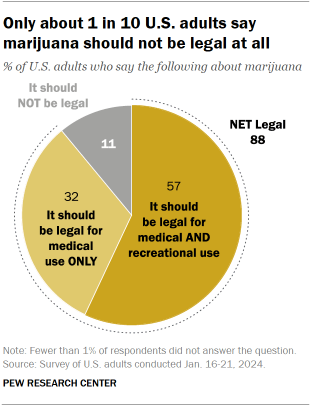
An overwhelming share of U.S. adults (88%) say marijuana should be legal for medical or recreational use.
Nearly six-in-ten Americans (57%) say that marijuana should be legal for medical and recreational purposes, while roughly a third (32%) say that marijuana should be legal for medical use only.
Just 11% of Americans say that the drug should not be legal at all.
Opinions about marijuana legalization have changed little over the past five years, according to the Pew Research Center survey, conducted Jan. 16-21, 2024, among 5,14o adults.
The impact of legalizing marijuana for recreational use
While a majority of Americans continue to say marijuana should be legal , there are varying views about the impacts of recreational legalization.
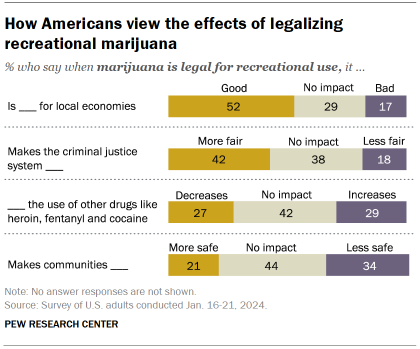
About half of Americans (52%) say that legalizing the recreational use of marijuana is good for local economies; just 17% think it is bad and 29% say it has no impact.
More adults also say legalizing marijuana for recreational use makes the criminal justice system more fair (42%) than less fair (18%); 38% say it has no impact.
However, Americans have mixed views on the impact of legalizing marijuana for recreational use on:
- Use of other drugs: About as many say it increases (29%) as say it decreases (27%) the use of other drugs, like heroin, fentanyl and cocaine (42% say it has no impact).
- Community safety: More Americans say legalizing recreational marijuana makes communities less safe (34%) than say it makes them safer (21%); 44% say it has no impact.
Partisan differences on impact of recreational use of marijuana
There are deep partisan divisions regarding the impact of marijuana legalization for recreational use.
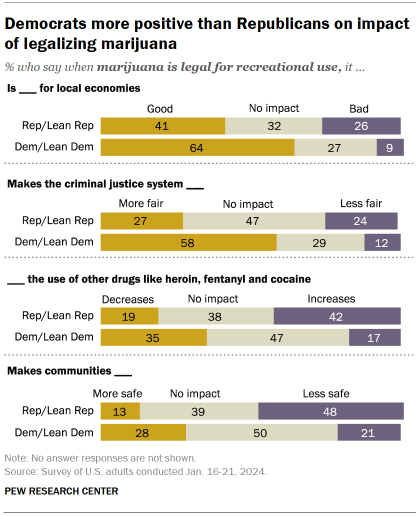
Majorities of Democrats and Democratic-leaning independents say legalizing recreational marijuana is good for local economies (64% say this) and makes the criminal justice system fairer (58%).
Fewer Republicans and Republican leaners say legalization for recreational use has a positive effect on local economies (41%) and the criminal justice system (27%).
Republicans are more likely than Democrats to cite downsides from legalizing recreational marijuana:
- 42% of Republicans say it increases the use of other drugs, like heroin, fentanyl and cocaine, compared with just 17% of Democrats.
- 48% of Republicans say it makes communities less safe, more than double the share of Democrats (21%) who say this.
Demographic, partisan differences in views of marijuana legalization
Sizable age and partisan differences persist on the issue of marijuana legalization though small shares of adults across demographic groups are completely opposed to it.
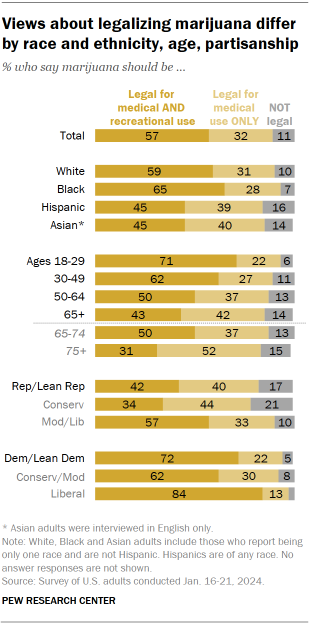
Older adults are far less likely than younger adults to favor marijuana legalization.
This is particularly the case among adults ages 75 and older: 31% say marijuana should be legal for both medical and recreational use.
By comparison, half of adults between the ages of 65 and 74 say marijuana should be legal for medical and recreational use, and larger shares in younger age groups say the same.
Republicans continue to be less supportive than Democrats of legalizing marijuana for both legal and recreational use: 42% of Republicans favor legalizing marijuana for both purposes, compared with 72% of Democrats.
There continue to be ideological differences within each party:
- 34% of conservative Republicans say marijuana should be legal for medical and recreational use, compared with a 57% majority of moderate and liberal Republicans.
- 62% of conservative and moderate Democrats say marijuana should be legal for medical and recreational use, while an overwhelming majority of liberal Democrats (84%) say this.
Views of marijuana legalization vary by age within both parties
Along with differences by party and age, there are also age differences within each party on the issue.
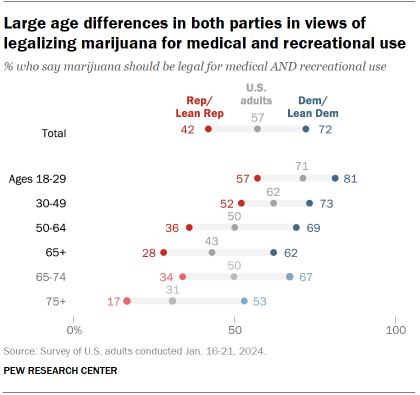
A 57% majority of Republicans ages 18 to 29 favor making marijuana legal for medical and recreational use, compared with 52% among those ages 30 to 49 and much smaller shares of older Republicans.
Still, wide majorities of Republicans in all age groups favor legalizing marijuana at least for medical use. Among those ages 65 and older, just 20% say marijuana should not be legal even for medical purposes.
While majorities of Democrats across all age groups support legalizing marijuana for medical and recreational use, older Democrats are less likely to say this.
About half of Democrats ages 75 and older (53%) say marijuana should be legal for both purposes, but much larger shares of younger Democrats say the same (including 81% of Democrats ages 18 to 29). Still, only 7% of Democrats ages 65 and older think marijuana should not be legalized even for medical use, similar to the share of all other Democrats who say this.
Views of the effects of legalizing recreational marijuana among racial and ethnic groups
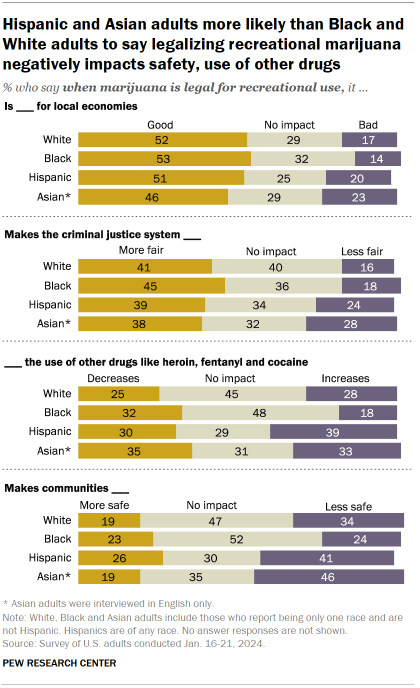
Substantial shares of Americans across racial and ethnic groups say when marijuana is legal for recreational use, it has a more positive than negative impact on the economy and criminal justice system.
About half of White (52%), Black (53%) and Hispanic (51%) adults say legalizing recreational marijuana is good for local economies. A slightly smaller share of Asian adults (46%) say the same.
Criminal justice
Across racial and ethnic groups, about four-in-ten say that recreational marijuana being legal makes the criminal justice system fairer, with smaller shares saying it would make it less fair.
However, there are wider racial differences on questions regarding the impact of recreational marijuana on the use of other drugs and the safety of communities.
Use of other drugs
Nearly half of Black adults (48%) say recreational marijuana legalization doesn’t have an effect on the use of drugs like heroin, fentanyl and cocaine. Another 32% in this group say it decreases the use of these drugs and 18% say it increases their use.
In contrast, Hispanic adults are slightly more likely to say legal marijuana increases the use of these other drugs (39%) than to say it decreases this use (30%); 29% say it has no impact.
Among White adults, the balance of opinion is mixed: 28% say marijuana legalization increases the use of other drugs and 25% say it decreases their use (45% say it has no impact). Views among Asian adults are also mixed, though a smaller share (31%) say legalization has no impact on the use of other drugs.
Community safety
Hispanic and Asian adults also are more likely to say marijuana’s legalization makes communities less safe: 41% of Hispanic adults and 46% of Asian adults say this, compared with 34% of White adults and 24% of Black adults.
Wide age gap on views of impact of legalizing recreational marijuana
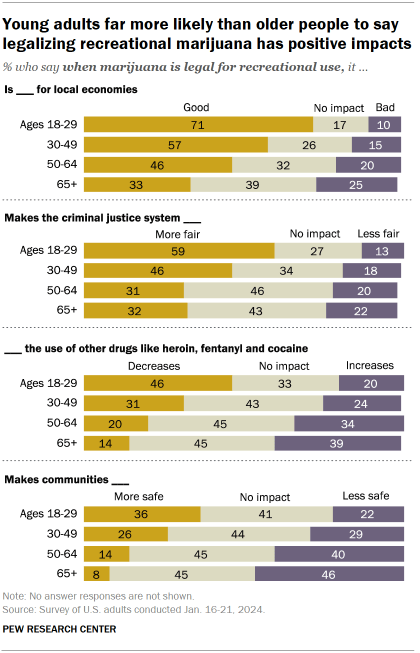
Young Americans view the legalization of marijuana for recreational use in more positive terms compared with their older counterparts.
Clear majorities of adults under 30 say it is good for local economies (71%) and that it makes the criminal justice system fairer (59%).
By comparison, a third of Americans ages 65 and older say legalizing the recreational use of marijuana is good for local economies; about as many (32%) say it makes the criminal justice system more fair.
There also are sizable differences in opinion by age about how legalizing recreational marijuana affects the use of other drugs and the safety of communities.
Add Pew Research Center to your Alexa
Say “Alexa, enable the Pew Research Center flash briefing”
Report Materials
Table of contents, most americans now live in a legal marijuana state – and most have at least one dispensary in their county, 7 facts about americans and marijuana, americans overwhelmingly say marijuana should be legal for medical or recreational use, clear majorities of black americans favor marijuana legalization, easing of criminal penalties, religious americans are less likely to endorse legal marijuana for recreational use, most popular.
About Pew Research Center Pew Research Center is a nonpartisan fact tank that informs the public about the issues, attitudes and trends shaping the world. It conducts public opinion polling, demographic research, media content analysis and other empirical social science research. Pew Research Center does not take policy positions. It is a subsidiary of The Pew Charitable Trusts .

IMAGES
VIDEO
COMMENTS
Competition Law: Exploring the Range of Research Paper Topics. Competition law, also known as antitrust law in some jurisdictions, is a crucial area of legal study that aims to promote fair competition and prevent anti-competitive practices in the marketplace. It plays a vital role in maintaining a level playing field for businesses ...
Committee on Publication Ethics (COPE) This journal is a member of and subscribes to the principles of the Committee on Publication Ethics (COPE) publicationethics.org. Publishes peer-reviewed original research dedicated to competition law, economics and policy, including developments in the United States, the European.
Competition Law Dissertation Topic Examples. 3rd Oct 2019 Law Dissertation Topic Reference this In-house law team. Competition Law aims to promote healthy competition in a market by regulating anti-competitive conduct by companies and organisations. Examples of such anti-competitive practices are firms fixing prices, or dominating a market ...
The debate on the challenges posed by digital platforms has captured a large share of the attention from the antitrust community in the last years.
Canada's competition laws just changed: Here's what you need to know. Jennifer Quaid, L'Université d'Ottawa/University of Ottawa. A small set of changes to competition law were just ...
The interaction between sustainability and competition law has recently come onto the agenda of many competition agencies and international institutions. The International League of Competition Law (LIDC) has thus decided to explore the topic at the LIDC Congress on 20-22 October 2022 in Milano. This report provides an introduction into the ...
It takes a global comparative approach to explore competition law and policy in a range of jurisdictions with differing political economies, legal systems and stages of development. A set of expert international contributors examine the operation and enforcement of competition law around the world in order to globalize discussions surrounding ...
Competition law - known as antitrust law in the United States and anti-monopoly law in China and Russia - aims to ensure market competition and consumer welfare by regulating anti-competitive conduct in domestic economies. Until the mid-20th century, there were less than ten competition regimes worldwide. 1 However, upon the end of the ...
Marta Vejseli. On June 29, 2023, the judgment concerning the case C-211/22, Super Bock v. Portuguese Competition Authority, was released by the European Court of Justice ("ECJ"). This judgment ...
Abstract. Competition law shapes the conduct of business firms by deterring conduct that can harm both private interests—businesses and their employees, owners, and customers—and public interests such as the efficiency of markets, economic development, economic growth, and perhaps even social and political and economic stability.
T1 - Current Issues in Competition Law: Practice and Perspectives. A2 - Gvozdenovic, Michael. A2 - Puttick, Stephen. PY - 2021. Y1 - 2021. N2 - Over the past 30 years, the Australian statutory regime regulating competition and restrictive trade practices has been the subject of much significant reform.
A List Of Potential Research Topics In Antitrust and Competition Law : Data privacy regulations and antitrust compliance. Vertical restraints in e-commerce: challenges and regulation. Technology and antitrust: a review of challenges and policy responses. Abuse of dominance in tech markets: recent cases and trends.
The latest competition legislation of India is a civil legis-lation and mandates the Commission to abide by the principles of natural justice.16 Cartels and bid rigging are the most pernicious anti-competitive practices, yet the law stipulates a rebuttable presumption regime in favour of the respondents.
Competition law is an economics-based law designed to regulate anti-competitive conduct of market participants. This article examines the economic circumstances in which India acquired its modern competition law and evaluates the sufficiency of this law for recent developments in India's digital economy. ... Centre for Business Research ...
The College of Europe's Global Competition Law Centre "aims at promoting cutting-edge research in competition law and economics" and posts a working paper series on its website. Papers are submitted in French or English. ... The OECD's website on competition includes descriptive pages on sub-topics, including cartels and anti-competitive ...
Video (online) Consult the top 50 dissertations / theses for your research on the topic 'Competition law.'. Next to every source in the list of references, there is an 'Add to bibliography' button. Press on it, and we will generate automatically the bibliographic reference to the chosen work in the citation style you need: APA, MLA, Harvard ...
Well over one hundred countries now have antitrust (laws promoting competition), and the majority of these are poor countries. Antitrust generally came to these nations as part of a package of market-oriented reforms after the final collapse of the Soviet economic model in the last decades of the twentieth century. Antitrust law in poor ...
Unrivaled resource for international competition law research. 15,000+ Commission and Court Decisions. Kluwer Competition Law includes a comprehensive and continuously growing collection of decisions on antitrust from the European Commission and from the Court of Justice of the European Union, including Opinions of the Advisory Committees, Final Reports of the Hearing Officer and Opinions of ...
There is also an internal 'competition' for resources (even within larger companies, and between various compliance topics)—where competition law is seen to be 'merely' punitive (rather than encouraging and incentivizing compliance activities), the compliance efforts may lose out in the internal allocation of resources to other ...
Competition law is an essential tool to maintain balance in the market by ensuring that any producer will sell his products in the market only at the price which the market is prepared to bear. Also, to ensure there is a perfect competition in the market whereby the producer is the price maker with no capacity to affect the price by his own ...
Without any ambition to be exhaustive, and just for illustrative purposes, these contributions included an article by Michele Grillo on the role of the relatively new Italian competition authority (Autorita' Garante della Concorrenza e del Mercato) in creating the conditions for non-discriminatory competition in markets.In 2001 Giovanni Ramello () offered some reflections on the debate about ...
I2 - Education and Research Institutions. Browse content in I2 - Education and Research Institutions; I20 - General; I23 - Higher Education; Research Institutions; I24 - Education and Inequality; I3 - Welfare, Well-Being, and Poverty. Browse content in I3 - Welfare, Well-Being, and Poverty; I30 - General; K - Law and Economics
In order to understand a specific competition law regime, it is necessary to identify the goals that shape them. Some goals are economic. These include efficiency, consumer welfare, and economic development. Other goals include fairness, privacy, and economic freedom. This chapter identifies each of these goals, probes the reasons for them ...
The law requires some of the world's biggest technology companies to comply with a long list of new rules aimed at boosting competition in digital advertising, online search and app ecosystems.
According to Penn Carey Law's Serena Mayeri, the majority opinion in Dobbs v. Jackson Women's Health Organization relies upon a flawed, results-driven historical methodology to deny fundamental freedoms. In " The Critical Role of History After Dobbs ," published in the Journal of American Constitutional History, Serena Mayeri, Arlin M ...
A 57% majority of Republicans ages 18 to 29 favor making marijuana legal for medical and recreational use, compared with 52% among those ages 30 to 49 and much smaller shares of older Republicans. Still, wide majorities of Republicans in all age groups favor legalizing marijuana at least for medical use. Among those ages 65 and older, just 20% ...